#i probably should of mentioned it in the last post about Chronicle Zero but i am aware that the whole “something is happening” could be
Explore tagged Tumblr posts
Text
Woop woop!
I'm very excited to see what the changes and adjustments are, and how it relates back to some of the things I've discussed and shared here.
At the very least it will be hella entertaining to watch (again)
-> Boo! You've got an update!
The Founders Cut will be out in the next 2 to 3 months! If nothing else it'll be out by the end of this year :D
#gen loss#generation loss#zero talks#zero thoughts#i probably should of mentioned it in the last post about Chronicle Zero but i am aware that the whole “something is happening” could be#false and that the gap of Chrono posts is just because of the Rebrand and a plethora of other things that aren't lore related.#but its fun to think so anyways
582 notes
·
View notes
Text
Thanks to @onereyofstarlight for the tag!
1. What fandoms have you written for?
This is embarrassing but I actually had to look at both FFnet and AO3 because I couldn’t remember all of them. TRON: Legacy, Assassin’s Creed, Star Wars, Lord of the Rings and the Hobbit, Sherlock, Final Fantasy VII and XV and Kingsglaive, Voltron: Legendary Defender, Merlin, Skyrim, and, of course, Thunderbirds. I have a couple other fandoms that crop up in various wips, including a Tom Swift/Thunderbirds crossover that I really should finish.
2. How many works do you have on AO3 &/or FFNet?
FFnet has 45, and AO3 has 41. There’s also a couple stories lurking on tumblr, notably a final chapter for Reflection.
3. What are your top 3 fics by kudos on A03 &/or Favs on FFNet?
AO3 dominates in this area, if I can use a word like “dominates” for stories that have less than 125 kudos each haha. Oh well, the numbers don’t matter!
1. 118 kudos on tell the shades apart (my world is black and white)
2. 94 kudos on Reflection
3. 91 kudos on The 43rd Hour
4. Which 3 fics have the least kudos & Favs?
Again on AO3:
1 kudos on I Am You (And You Are Me)
5 kudos on The Dragonborn Chronicles
6 kudos on cynosure
5. Which Fic has the most comments and which has the least?
Reflection has the most at 29 threads, and I Am You (And You Are Me) has the least at zero.
6. Which complete fic do you wish had gotten more attention?
Lodestar, definitely. Sure, it’s for something of a rarepair, but they aren’t that rare, and I just really really like the way the story came together. On the other hand, of course my unfinished Merlin fic has gotten probably the most attention, because that’s just the way it goes, eh?
7. Have you written any crossovers?
None that I’ve published! I have various crossovers lurking in mostly unfinished states, including the aforementioned Tom Swift/Thunderbirds crossover, and an Assassin’s Creed/Thundeerbirds crossover that is very good and I should also finish. There’s an Expanse/Thunderbirds fic lurking in my brain that I may or may not ever commit to paper, who knows. I’ve also very vaguely toyed with a Batman/Thunderbirds crossover, in the sense that “nebulous” is too strong a word for the kind of toying I’ve been doing.
8. What is the craziest fic you’ve written?
I don’t really write crazy or crack or humor in general, so probably the closest thing to “crazy” is On the Lam, which was the result of wanting to throw Scott and Penelope toward an Egyptian stud farm. It ended up being the host for a bad joke about that, courtesy of one @thebaconsandwichofregret, who consistently gives some of the best dialogue advice I’ve ever encountered.
Actually, the true answer is probably a chapter in Glimpses into a Supernova, maybe the one about blood? It seems bonkers when I think back on it now, but I admittedly haven’t read it in many years. Possibly I am misremembering. Glimpses has some weird ones, though.
9. What’s the fic you’ve written with the saddest ending?
It’s a tossup between The Painting and a place where the water touches the sky. The former deals with a prior off-screen death; the latter is (maybe??) an on-screen death. People seemed upset by it, at any rate. I said it was ambiguous!
10. What’s the fic you’ve written with the happiest ending?
“Happy” is probably a matter of perspective? Depends on the overall reading experience and the ending within that context. Either septet or Three Towels and a Tracy, they’re both pretty fluffy overall.
11. What is your smuttiest fic?
protoinstincts, which I completely forgot I wrote and then rediscovered like a year later and realized “hey, this is actually pretty good” and you know what, despite it not being overly spicy, it is pretty good.
12. Have you ever received hate on a fic?
Not hate, per se, but someone left a review on Less Than Nothing saying they “didn’t like” that I “wrote the story as a series of drabbles.” Cool, I didn’t write the story for you, random guest reader, and the back button exists, friend 😂 It didn’t bother me on a personal level because I wrote the fic for an audience of one (incidentally, not myself and rather the recipient of a secret santa event), but I was mad because the reviewer had no way of knowing where I was at as a writer, and I know from longtime observation how that kind of comment can crush less experienced or confident writers.
Don’t leave flames, kids, you don’t understand the power your words have. Don’t like, don’t read.
13. What is the nicest comment you’ve received?
The nicest? Goodness. Hmm. I’d have to go hunting to find the nicest, but in recent memory, @ayzrules sent me a couple passages from Spanish texts she’s been studying that reminded her of my writing, and I was honestly so touched by the fact that she even thought to make such comparisons, much less mention them to me. Taking the time to familiarize yourself with someone’s style until you can make comparisons between it and someone else’s work is so much more meaningful to me personally than a basic “Nice story!” or “Loved this!” type of comment ever could be. <3 Ayz <3
14. Have you ever had a fic stolen?
Not that I’m aware of, but I’ve never gone looking on any sort of copycat site or whatever either.
15. How many fics do you have marked as incomplete?
Two. First is The Dragonborn Chronicles, which is a retelling of Skyrim from Lydia’s perspective via her journal, to complement the in-game journal. It’s a slog of a style to write, though, even for someone who loves writing first person and doesn’t really want to write a lot of dialogue, and the outline is huge, and the story will be many times more huge, and just. Some day. Some day.
Second is tell the shades apart (my world is black and white), which has always been unfinished because the outline itself is over seven thousand words and the fully written story would undoubtedly land between 100,000 and 200,000 words, and there’s no way I’m writing that. I’ve always meant to upload the outline, but I got kind of self-conscious about the way I formatted it, and ugh I just haven’t bothered. One day, one day, right?
Moral of the story is I’m intensely a short story writer, and I’ve really found myself settling into that role over the last couple years. Better a clipped, punchy short story than a bloated slog of an epic.
16. Which of the WIPS will most likely be finished first?
Literally no one knows that. I wrote 95% of the observable entropy of a closed system over five years ago, and then I proceeded to pull it out roughly once a year and write and rewrite various endings until last month, which was when I finally figured out how I wanted to end the story. septet, too, languished for about five years before I finally remembered it existed and managed to wrangle an ending. Endings are hard, man. So are those third plot points. Terrible creatures, those, bog me down every time.
17. Which WIP are you looking forward to finishing?
Uh... mm. See. If I were looking forward to finishing any of them, I’d be actively working on them. At this moment, writing fic isn’t exactly high on my list of priorities, but I am also coming off a four-day idle game bender, so I still feel like I haven’t quite reengaged with myself as a living person. Give me another few days and I might have an answer.
(I am always most looking forward to finishing this ridiculous Ignis-drives-the-Audi-R8 fic that’s been languishing in my wips for literal years. As mentioned above, third plot points. Killer, man.)
(oh and also the working-titled the art of murder. Scott and Penny attend a private art auction. Things don’t go to plan. It, too, is stuck at the third plot point. I know, I know I have a problem, shush.)
18. Is there a WIP that you’re considering abandoning?
Any wip has the potential to be revived—this year and the old wips I’ve unearthed, dusted off, finished, and posted have been proof of that. I don’t intentionally permanently abandon anything for that reason, some stories just probably will remain dusty old wips forever because I didn’t actually need or want to write the full story for one reason or another.
19. Which complete fic would you consider rewriting?
Now that’s an interesting question. Hmm! Honestly? None of them. Once I finish a story, I’m not inclined toward rereading it again any time soon, to the point of years in some cases, and I feel like I’ve moved on from the stories I wrote one, two, five, eight years ago in the actual writing sense. They’re finished stories, and on top of that are relics of their time, which doesn’t mean the stories don’t have any ongoing significance on a reading level—I just don’t have any interest in rewriting those particular stories. I’ve gotten them out of my head, to the point of not remembering at least a third of them on demand anymore, and I don’t have any desire to “retell” those exact stories. I do tend to tighten the wording and fix perceived errors/weaknesses whenever I do end up rereading an old story, and I usually silently update the AO3 version if I make any significant changes because AO3 makes it a breeze to update a posted fic. I might do FFnet too if I’m feeling up to it or have the time.
20. Which complete fic is your favourite?
Once upon a time I would’ve said Holding On, but I honestly find it kind of unbearably melodramatic now. the observable entropy of a closed system is equally melodramatic, as it was written in the same era, but at least it has the excuse of being told in second person and via a style that is a half step away from being poetry. Possibly I will reread it in a few years and find it equally obnoxious and overly dramatic, but it received some shockingly positive comments, which I wasn’t expecting at ALL, and I’ve been honestly blown away by the amount of praise it’s received. <3 to everyone who’s said anything about it!
21. What’s your total published word count?
141,000 on AO3, 160,000 on FFnet, but technically the light of my life SS wrote fifty thousand words of each. It’s too late for math.
I tag @velkynkarma, @lurkinglurkerwholurks, @writtenbyrain, @thebaconsandwichofregret, and anyone else who wants to play!
6 notes
·
View notes
Text
Fic Writer Meme
Thanks for the tag @thevikingwoman! This is a little different than others I’ve done in the past.
Name: gala. I’m galadrieljones on ao3 as well.
Fandoms: The Walking Dead, Red Dead Redemption 2, The Last of Us, Horizon: Zero Dawn, Dragon Age: Inquisition
Most popular oneshot: “Yours, Sadie Adler.” (RDR2, Arthur x Sadie)
Most popular multichapter: The Lily Farm (RDR2, Arthur x Mary Beth)
Actual worst part of writing: Not being able to just sit down and finish all my WiPs, or really control the direction and concentration of my creative energy. I wish I could finish a project before meaningfully moving onto the next, but that’s rarely the case. I am working on better planning though, like for Magnolia, to make sure it doesn’t get out of hand, or go past my initial plans and ambitions for it. This is how I’ve been waylaid in the past, ie: letting projects blow up and go too long and get too big without enough of an energetic plan for how to find the ending.
How you choose your titles: I like to make my titles part of the story and in some ways a little cryptic or playful, foiling major themes or motifs from the story/chapter in some sort of unexpected way. My favorite title lately is for the chapter in Magnolia called “Bullseye.” There is no mention of a bullseye in the story, but it is a veiled reference to three things: 1.) Daryl is an archer and is also fletching an arrow for a large part of the chapter; 2.) Multiple thematically important references to Target; and 3.) Noah guessing that Daryl is in love with Beth, which hits the nail on the head for both Daryl and the reader. Daryl won’t admit it, but he knows it’s true. Bullseye, Noah!
Do you outline: I try to, now. I don’t make charts or anything, but I do like to plan out a general plot and some anchoring scenes to make the plot feel real and workable many chapters in advance. When I say workable I mean like, sometimes a plot point seems interesting, but then when you get there, it doesn’t make sense in-scene. Sketching out hypothetical scenes in advance is how I reconcile this.
Ideas I probably won’t get around to: There are many, but the biggest one is probably my prequel to The Dead Season and sequel to Teen Wolf, which chronicles Solas and Mythal during The Great War in Arlathan. It would be very Shakespearean and unfold in acts that span about ten years, from the time Solas joins Mythal to save his mother’s life all the way to Ghilan’nain’s betrayal, Mythal’s death, and the construction of the Veil. It would also focus on Solas’s friendship with Abelas and his short, tortured reunion with Ghilan’nain when they’re both like 21 years old. Yeah I’ll mostly likely never write it but a girl can dream.
Callouts @ Me: Focus on one project at a time instead of 2-3. You’ll be happier and way less stressed. Also don’t be afraid of letting go of old WiPs. If a story is meant to find its end, it will.
Best writing traits: I have always been very fast and very prolific. In terms of the writing itself, I feel good about my ability with pacing dialogue and setting scenes, as well as getting in and out of scenes fairly quickly, also knowing when a scene has gone off the rails, and having the discipline necessary to go back as far as I need to in order to get it back on again. Also I like my symbolist tendencies, like planting big meaning in small places via symbols and descriptive motifs. It makes writing more fun.
Spicy Tangential Opinion: The only dialogue tag you actually need is “said.” All of these posts and all this advice from 11th grade English teachers about how “said is dead” or “said is boring” are wrong. If your dialogue is doing enough work, you do not need descriptive or cumbersome tags to modify it. If you need to modify dialogue, use actions, not tags, or description of something the character sees. Tags should be nearly invisible, there for pacing purposes, and to note who is saying what. Most anything other than “said” is distracting and can serve to break the reader’s immersion. If you want to get better at dialogue, force yourself only to use said. Everything else, put in the dialogue itself, or into the character’s actions and/or observations, and you’ll see what I mean. If you disagree with me, that’s your jam. But know that you will never convince me otherwise!
I’ll tag @salexectria @shallow-gravy @a-shakespearean-in-paris @idrelle @roguelioness @justaconsequence @darylbeth and anyone else who’d like to do this. No pressure! <3
8 notes
·
View notes
Text
‘The Absent Father and Spider-Man’s Unfulfilled Potential’: Rebuttal Part 1: Introduction
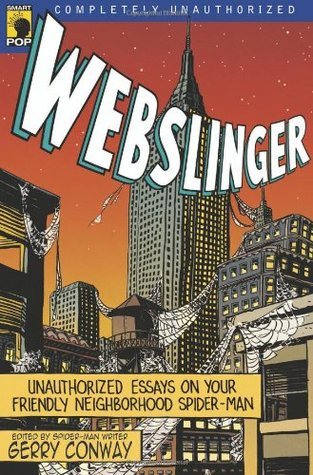
Master Post
Back in 2012 I read a very interesting book called ‘Webslinger: Unauthorized Essays on your Friendly Neighborhood Spider-Man’.
As the title suggests it was an anthology book made up of several different essays about Spidey (and edited by Gerry Conway himself).
The essays are an interesting read, though there are questionable points made and some inaccuracies.
Today though I’d like to debunk some points made in the essay titled ‘The Absent Father and Spider-Man’s Unfulfilled Potential’.
The reason for my desire to debunk parts of this essay is partially due to my inherent instinct to debunk problematic or misinformed stuff surrounding Spider-Man generally. However it’s also partially due to the author, J.R. Fettinger.
Fettinger is the creator and author of the essays found on ‘Spideykicksbutt.com’ and a regular panellist on the Spider-Man Crawlspace podcast. I respect both and the content they provide though there have been times I’ve disagreed with both and other times where quite frankly I think they’ve put forward statements that are outright wrong.
Fettinger and his work was the inspiration to an extent for me even choosing to write so much about Spider-Man, helped bring me back into fandom and his work helped me reconcile some things that I had felt made me an uninformed minority within fandom.
However, there have been times, more and more as the years move forward, wherein my eyes have narrowed at Fettinger’s statements regarding Spider-Man.
He once said something to the effect of ‘alcoholics are just stupid people doing stupid things through no fault but their own’.
He has repeatedly attested that it is morally wrong for Spider-Man and Batman to not simply murder characters like Joker or Carnage.
He has said that Otto’s actions towards Peter in Superior Spider-Man render him the worst enemy Peter has. This is in spite of him being a huge Norman Osborn fan.
He has essentially stated criminal killers like Shriek or Vermin (who suffer from severe mental disorders) deserve no sympathy.
He has said Kraven’s Last Hunt was flawed (to put it more delicately than he did) because Peter ‘never settled his score’ with Kraven.
He has even said that whenever DeMatteis gets into the psychological aspects of the characters he ‘goes off the deep-end’.
These views are most especially chronicled in his on-going segment of the podcast ‘Spider-History’ wherein he takes a month’s worth of (usually 616 Peter Parker) Spider-Man comics from a bygone month decades ago, recaps them and analyses the stories.
However, what is so frustrating to me about these segments as time has gone by is that Fettinger is overly critical and incredibly cynical. He has put forward his opinions as fact with little analysis or consideration of an alternative point of view.
To be blunt with relatively few exceptions he surmises each month in this section as mediocre-bad unless it contained something by Marv Wolfman or Roger Stern, two of his personal favourite runs.
Even then he puts across reductive summaries of the events of the book, in particular phrasing things to make certain characters (like Spider-Man himself) come across as worse than they actually are in the stories in question.
This is particularly a problem in my view because Fettinger’s status as a long read, knowledgeable and analytical fan confers onto him a certain degree of authority in regards to his statements about Spider-Man.
And you know what? It should.
He really does know A LOT about Spider-Man and he has made some incredible assessments about stories and characters related to the wall-crawler.
I cannot recommend you check out his website Spideykicksbutt enough.
But here is the thing...I do not advocate blind trust in his word, or anyone’s for that matter. Not even my own. I know A LOT about Spider-Man but I’m far from infallible.
Think for yourselves, do your own research, present your own arguments and counterpoints.
It’s what I do and why Fettinger frustrates me. Because he’s so belligerent to changing his views, most of which are adamantly cynical and judgemental.
Some people I’ve spoken to about this attribute this to his age. Most of his writing and podcast work has been produced when he was in his 40s or 50s.
It is often said that everyone becomes more cynical, grumpier and more stuck in their ways as they age.
I disagree with that in so far as not everyone becomes like that. And 40-60 is not a point when you are ‘done’ becoming who you are going to be and beyond changing.
It is the prerogative of old men to speak their minds but the WISE men are not adverse to changing them.
This is the root of my problems with Fettinger and his cynicism. Not to mention, I find cynicism simply lazy and foolish under most circumstances. Much as I find Fettinger’s ‘kill all criminals’ mentality to crime to be lazy and foolish.
These thoughts struck me when I re-read his essay from Webslinger. I read the essay upon first discovering his work but I apparently have changed in 6 years as I find much of it ill-considered, cynical, judgemental and problem riddled.
Hence my desire now to debunk it.
The gist of the essay is Fettinger talking about how Spider-Man has lots of unfulfilled potential and attributing this to the loss of his father figure Uncle Ben. He goes on to list off different father figures Peter has had and what the end result of their roles in his life might have been. For context this was written around the time of Civil War 2006.
My first and probably biggest bone of contention lies in how Fettinger frames Peter’s ‘unfulfilled potential’.
It’s here where you start to see his overly cynical and judgemental side.
I will not quote him word for word here because it’d take too long. But early on he writes that Spider-Man’s powers come at the price of his happiness, peace of mind and the normalcy that we all take for granted.
This is partially true but still misinformed.
Peter’s mind is most definitely not peaceful most of the time and his life not normal. But there is that key phrase ‘most of the time’. Not all of the time.
Even during his career Peter has had several moments of grace. Most of the stories transpiring in the immediate aftermath of Mary Jane’s return to his life in ASM v2 #50 come to mind issue #51 even calls out that nothing bad has really happened to get in the way of Peter and MJ’s reconciliation.
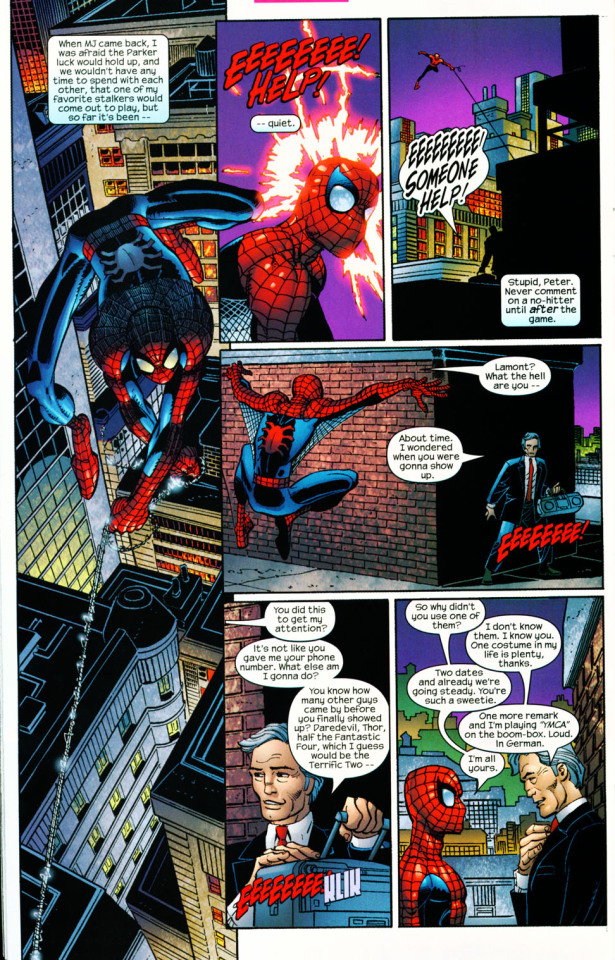
This oversight is particularly egregious since that period had only been a few years before the writing of this essay.
But it’s not as egregious as the other thing Fettinger said. That being Spider-Man has cost Peter his happiness.
Er....no.
There have been many things that have made Peter unhappy in the course of his superhero career but as ASM #500 clearly confirmed for us Peter, in spite of all that, is ultimately happy. Which was a big deal as Peter had just relived all his old battles at once.
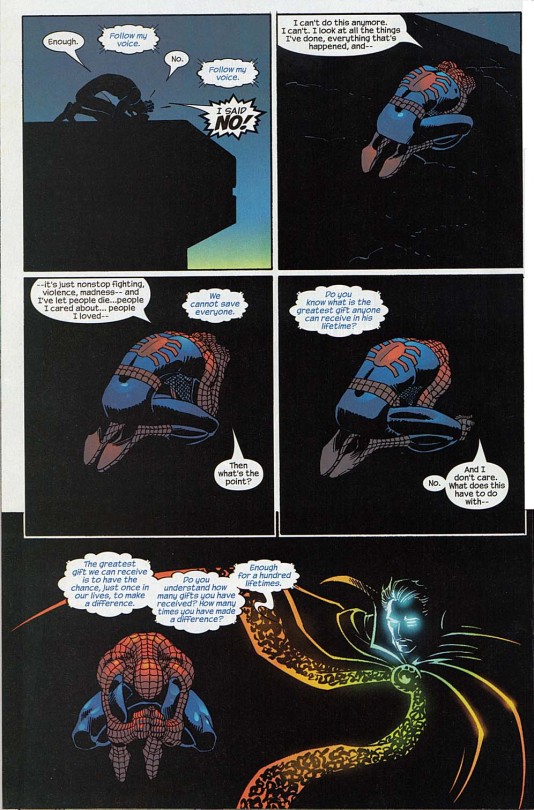
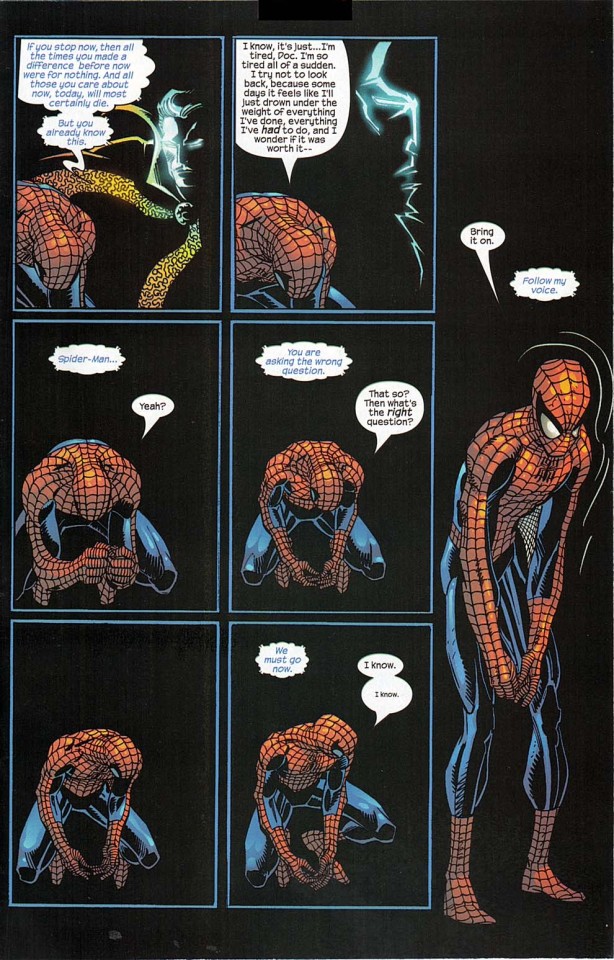
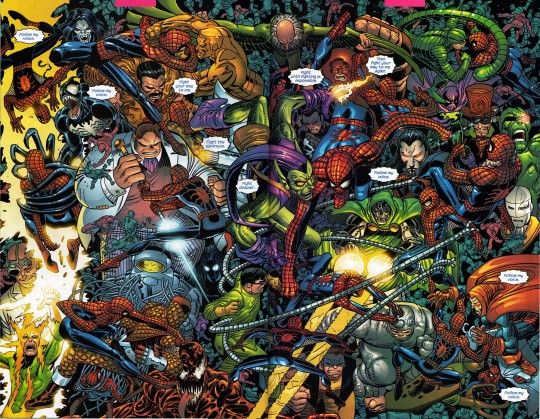
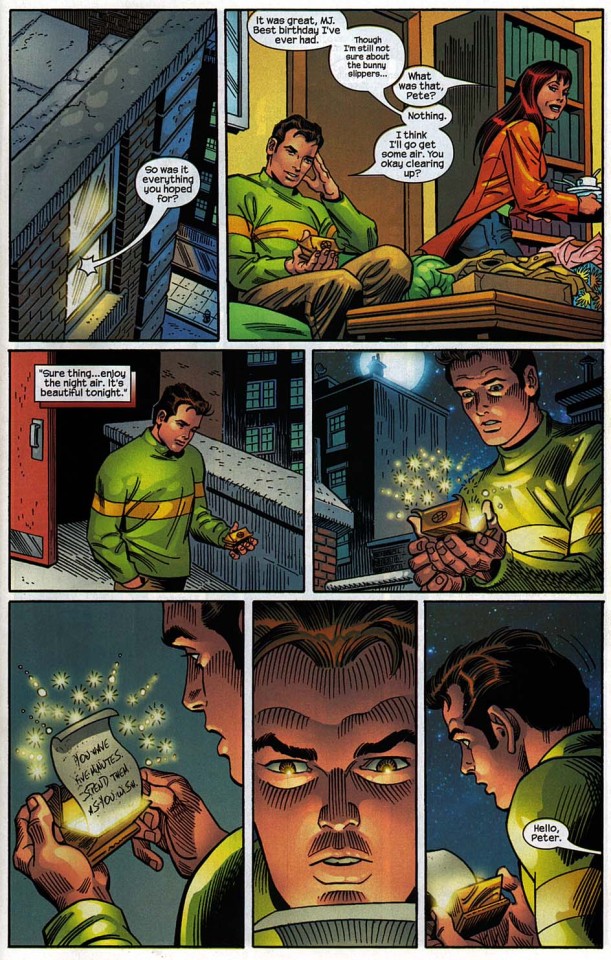
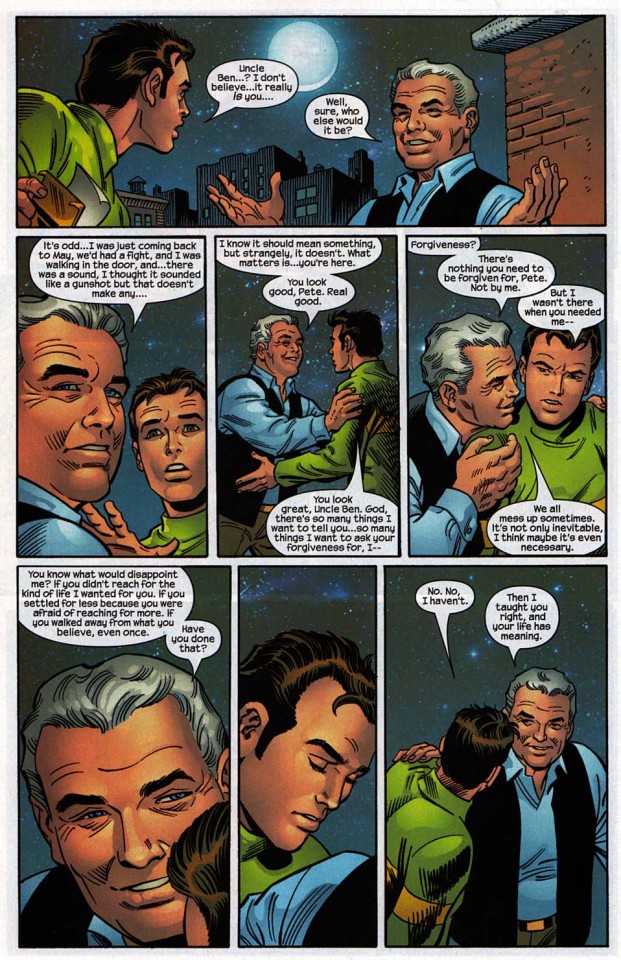
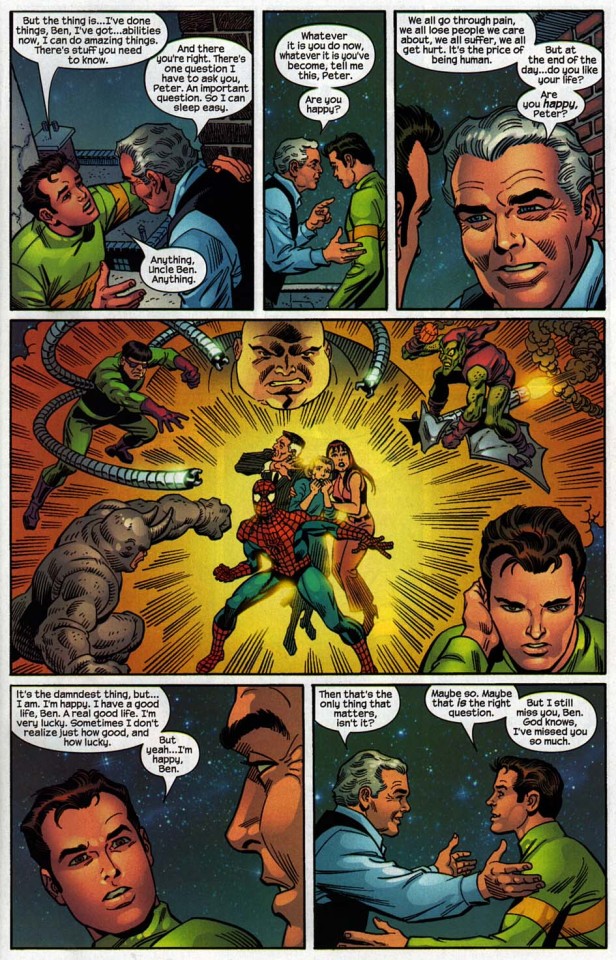
The omission of ASM #500’s ending is telling because Fettinger actively dislikes the story and the scene with Uncle Ben particularly. He’s labelled it as ‘banal’ and essentially said if he could talk with his own deceased father the conversation would’ve gone very differently. Problem is the the story was not about him and his family but about Spider-Man and HIS family!
Fettinger then asks if when Peter dies he’d be labelled as someone who fell short of his potential. He illustrates the point by comparing 15 year old Spider-Man to adult Spider-Man circa 2006.
He claims Peter made few adjustments to his fighting skills. Not true. The older Spider-Man beyond the Silver Age did in fact adjust some of his fighting skills, noticeably in regards to ramping up his speed during combat.
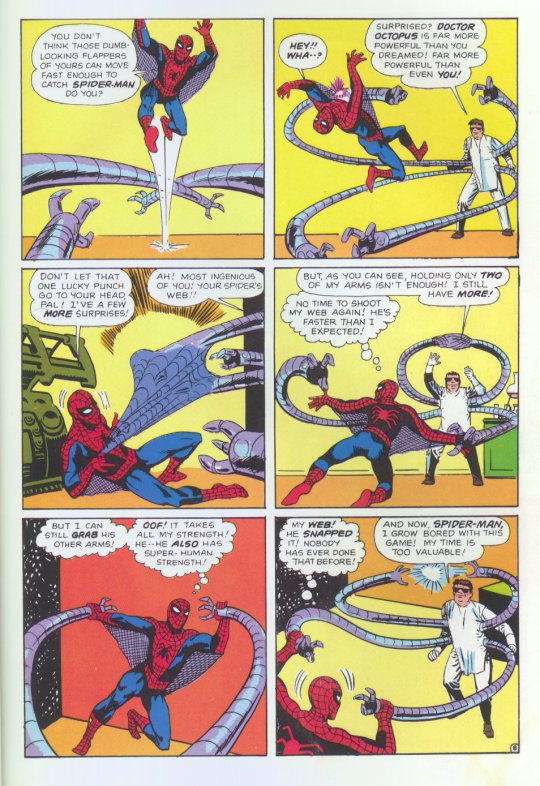
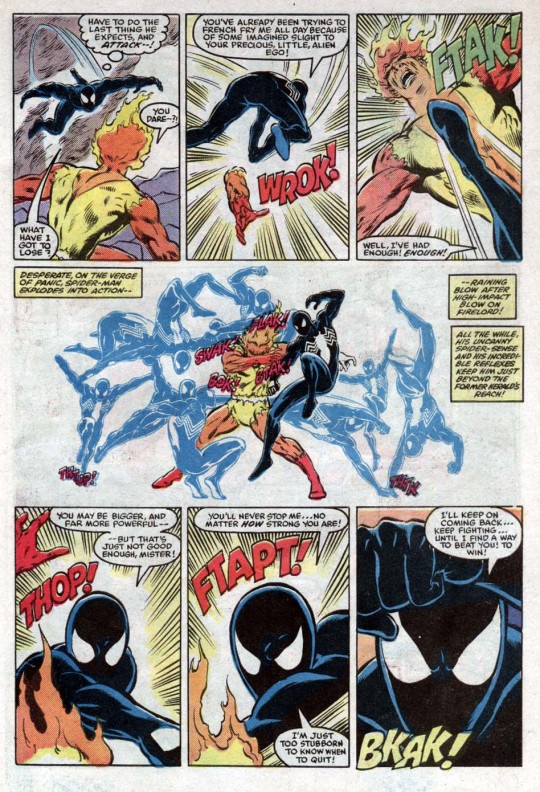
He also took martial arts lessons from Captain America in FNSM v1 #1, putting the techniques he learned from that into practice in the very same issue. That issue was published just a year before Fettinger’s essay by the way.
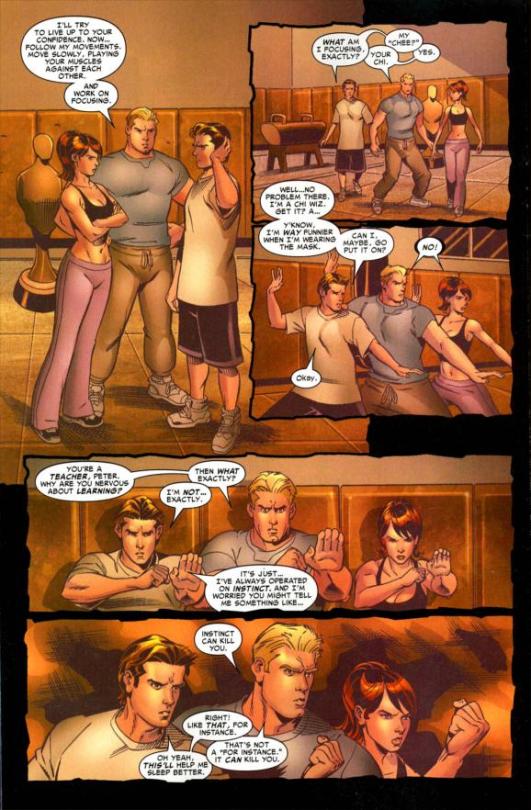

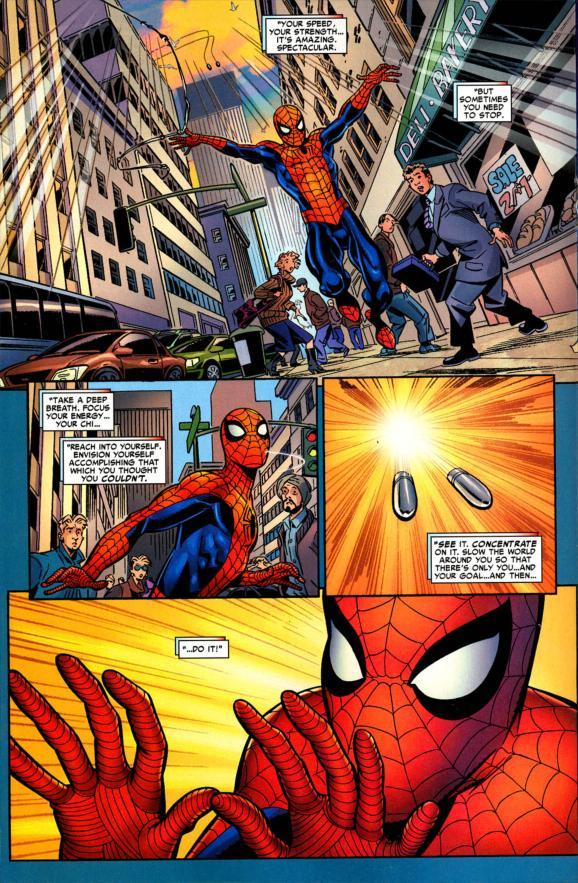
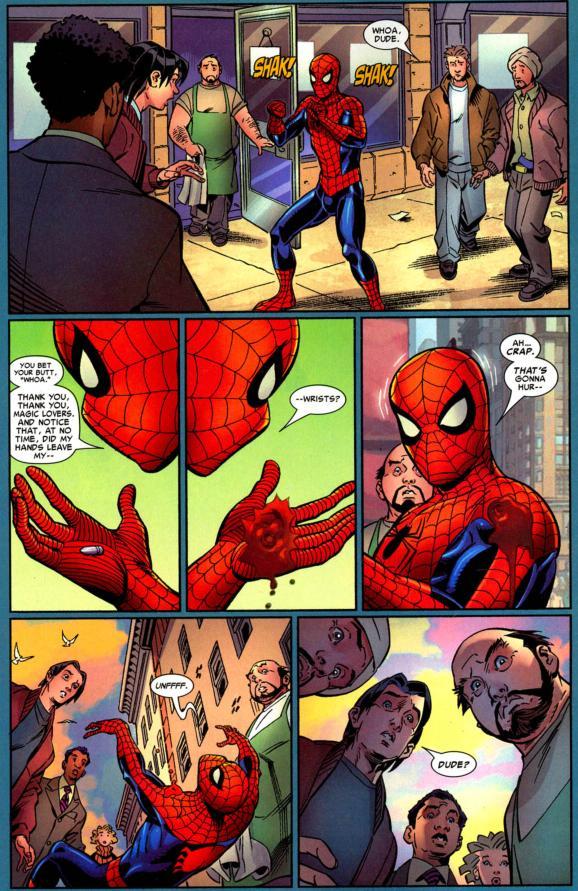
Granted these do not seem particularly significant.
But let’s flip the script a little bit. Let us presume Fettinger to be correct, Spider-Man between 1962-2006 had never evolved his fighting style significantly.
Is that really an example of Peter doing himself a disservice, of not fulfilling his full potential...or is it that the fighting style he had was not only adequate for the life he lived but in fact optimum?
Spider-Man after all has an incredibly effective and sophisticated fighting style. It is impossible to truly replicate by anyone exempting those of similar powersets to himself.
His immense strength allows him to plant himself on the ground and exchange simple punches, kicks, etc. with a lot of power behind them.
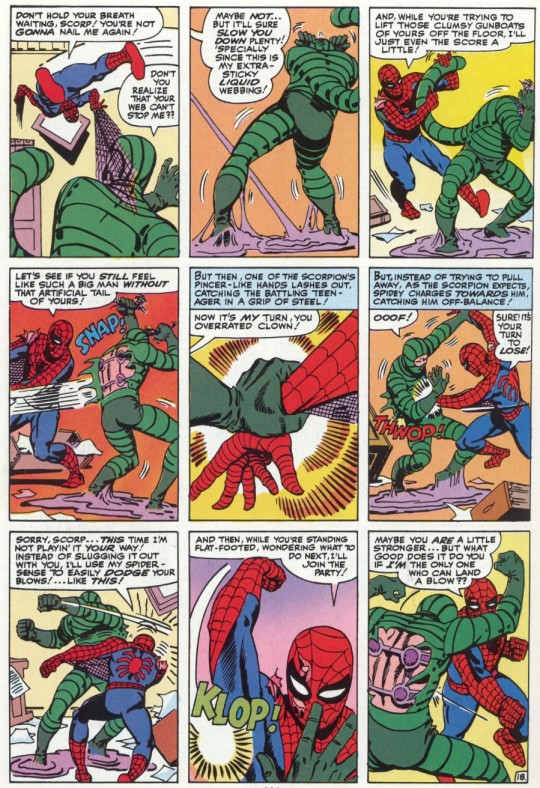
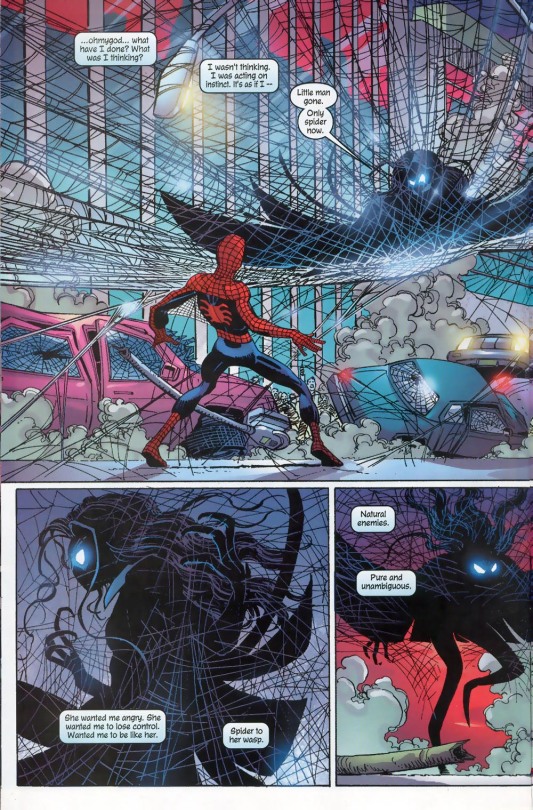
But with more room to manoeuvre his speed, wall crawling, web-slinging and agility allows him to augment that raw power to deliver a lot of hits in a short space of time from a near 360 degree axis. See his battle with Firelord above)for proof of this.
His webs can be used concussively, to distract, to incapacitate and can even act as a defensive shield.
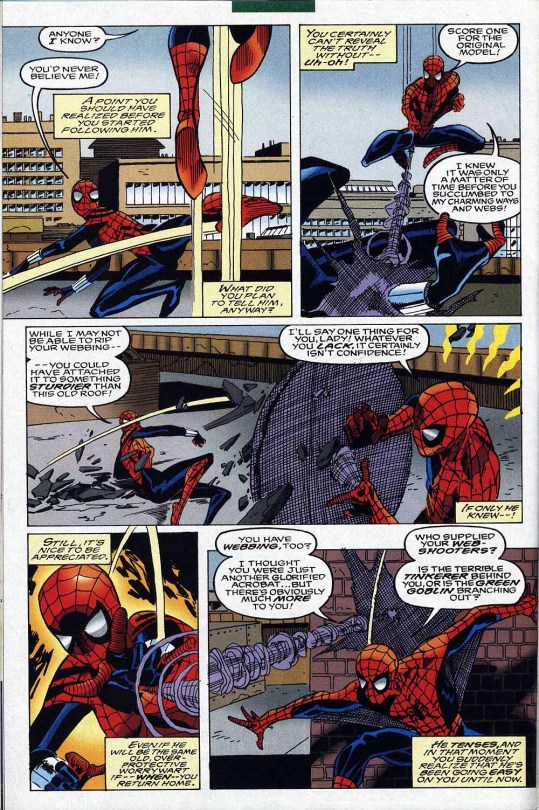
(I know the Spider-Girl image isn’t 616 but it might as well be if you know the contex behind the story)
And then there is his ace in the hole, the Spider Sense. This ability is linked to his reflexes and intuitively enables him to know an attack is coming. It almost automatically makes him adjust his movements accordingly in conjunction with his immense reaction speed and agility.
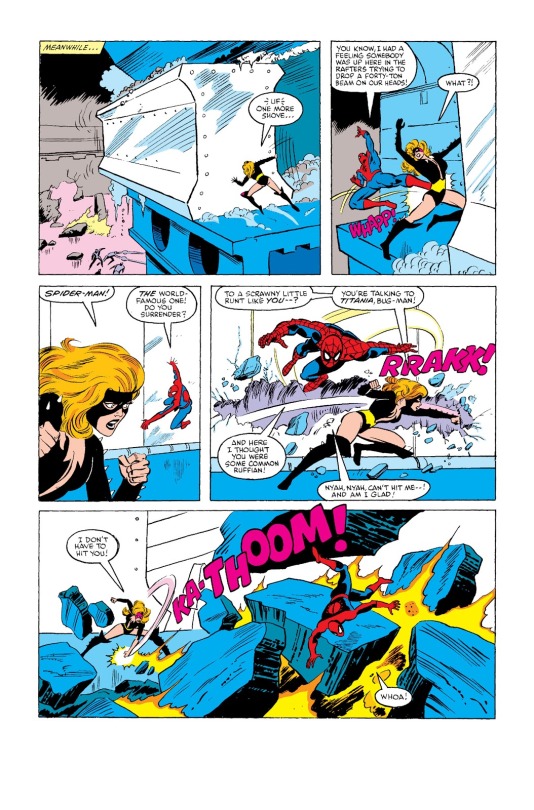
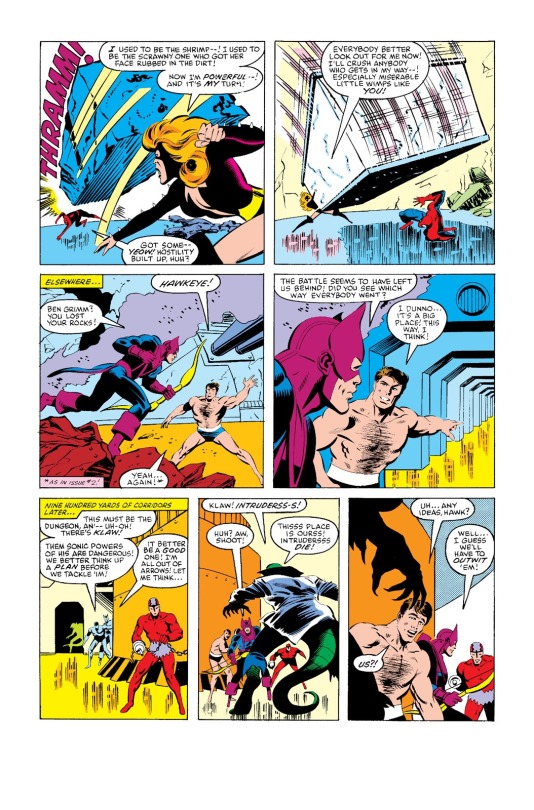
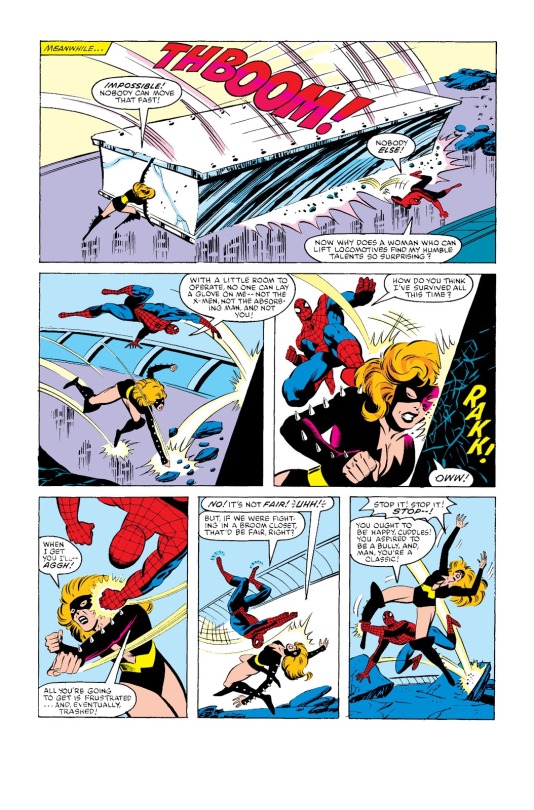
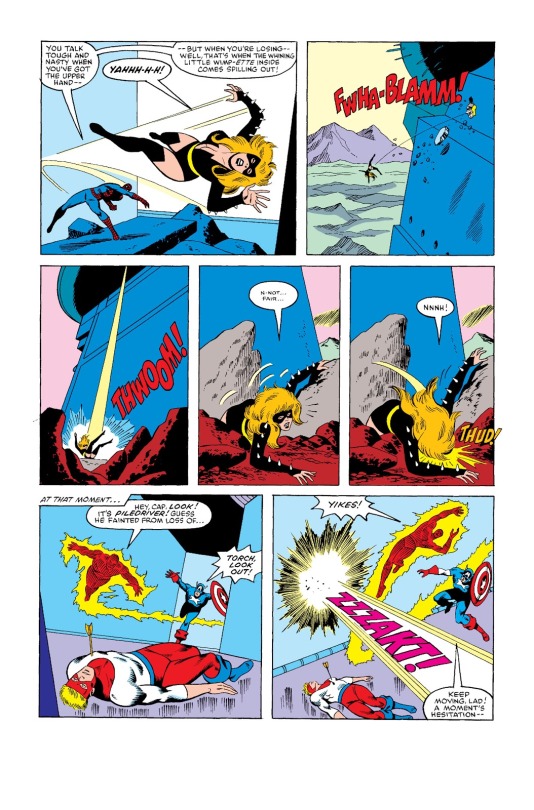
This fighting style had been enabling him to defeat a wide variety of foes across what was then 44 years of published stories.
So was it really that Peter was slacking off in not evolving it? Or was it more that he early on developed something extremely effective that didn’t need any real reinvention?
Moreover isn’t it impressive (rather than a point of condemnation) that Spider-Man essentially figured out the best way to fight with zero instruction or training when he was just a teenager. That’s incredible so it’s far from something to chastise him for simply because he hadn’t radically altered it.
What’s worse is Fettinger claimed that Peter ‘continued’ to rely upon sheer strength, raw intelligence, dumb luck and the stupidity/lack of imagination of his foes to win the day.
Let’s put aside for the moment how Peter has whipped up gadgets or chemicals when needs be.
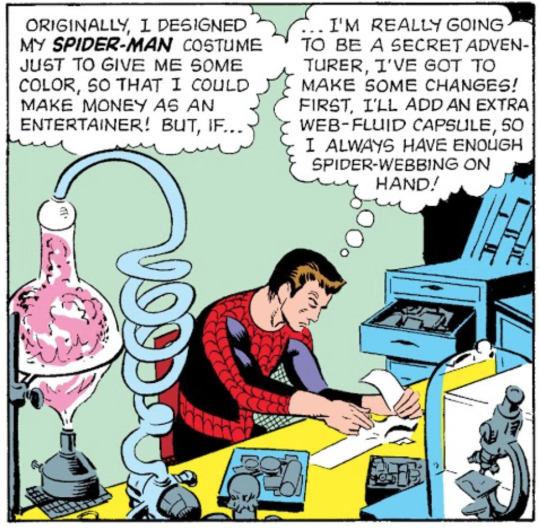


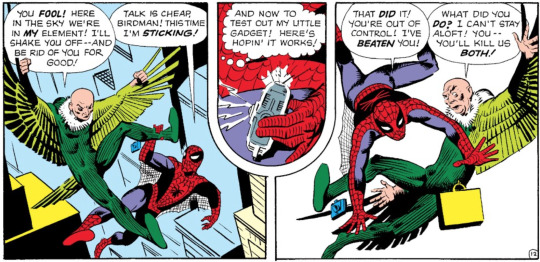

Let’s also ignore how his foes even upon trying new tricks have more often than not met with defeat anyway.
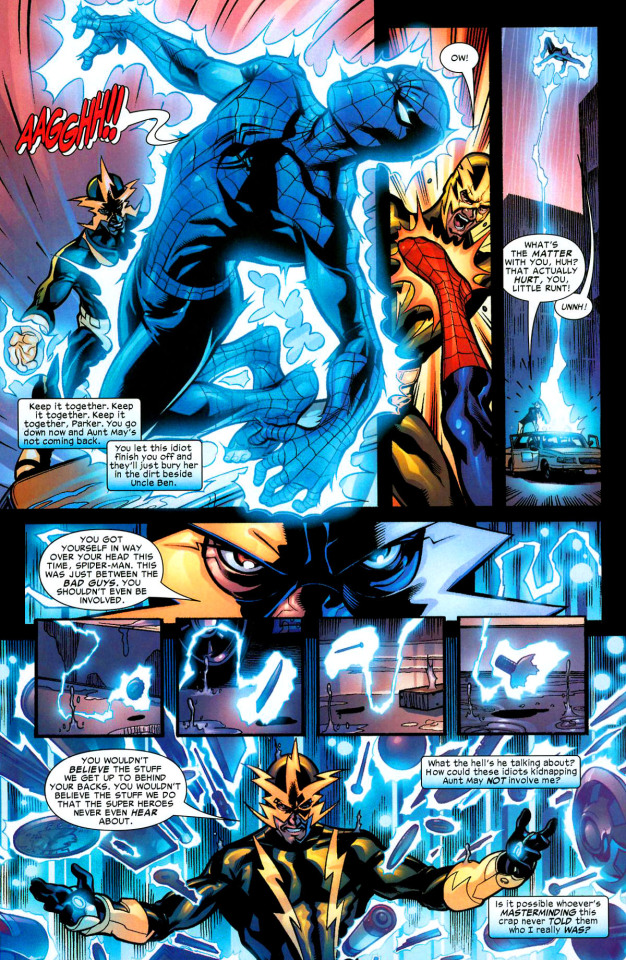
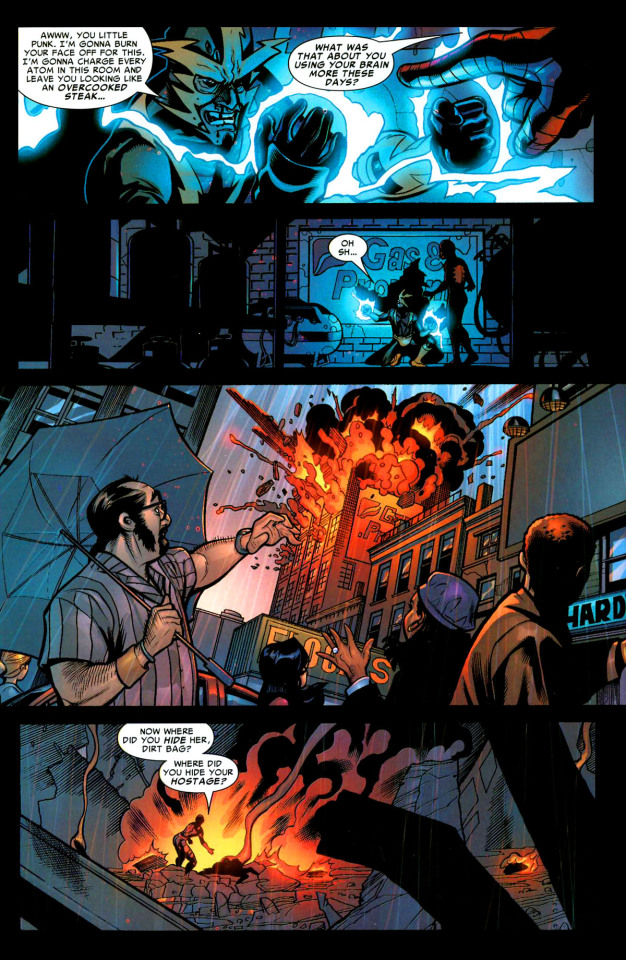
Let’s also entertain the idea that Peter truly does rely upon his foes stupidity and dumb luck in battle. Let’s do that even though he absolutely doesn’t, he’s very rarely just presumed he can win because a villain is dumb, but he has exploited that fact when presented with it; see 99% of Rhino fights. Hell let’s even ignore how Spider-Man uses his speed, and agility and webbing and spider sense in battle as much as his strength.
What exactly is Spider-Man supposed to rely on besides his sheer strength and raw intelligence?
Fettinger is calling Spidey out for relying upon his raw physical powers and his intelligence.
Like...what is an MMA or boxer supposed to rely on besides their muscle and their mind to strategize before and after a fight?
Fettinger continues to point out that exempting his Iron Spider outfit or his alien costume Peter has continued to rely on his ‘wash n’ wear red and blue pajamas’.
There are two waysto view this statement. Either Fettinger is being critical that Spider-Man has not opted to alter his costume aesthetically ever or else never opted to alter it in terms of being functional. That is to say it’s still just a piece of cheap cloth.
Both arguments are invalid criticisms.
Peter has changed his look more than once throughout the years, noticeably he wore a cloth version of his black suit, used two rubber insulated outfits to fight Electro, made an armoured costume in Web of Spider-Man #100 and used four different costumes when he adopted four new identities for himself, all of which were used for different functions.
The black costume however served no function beyond enhanced stealth and Peter retired it due to him and his wife not liking how it reminded them of Venom, a notorious publically known homicidal maniac.
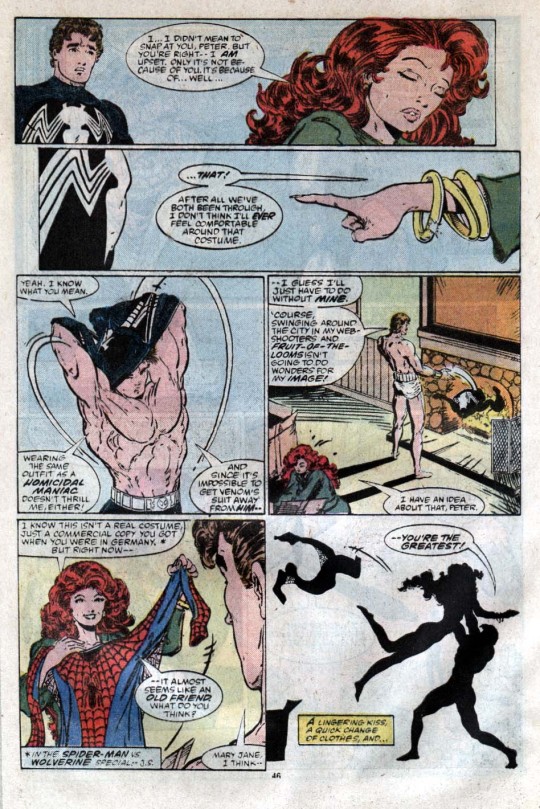
The Armoured suit was only created with access to ESU’s scientific resources, was destroyed on its first mission and realistically was compromising to Spidey’s fighting skills (hence Slott’s version was redesigned). It was also impractical as it was composed of a new hardened version of Peter’s webbing meaning it was never going to last anyway.
His rubber suits were similarly impractical for continual use and severely damaged during battles with Electro. They could not be worn as casually as his standard suit, realistically would’ve impeded mobility to a certain extent and were designed for one specific foe anyway. In fact Spidey usually ran into Electro by chance or else with limited time to intervene in his crimes. Meaning he’d not have the time to locate the rubber suit anyway. Besides...he usually managed to beat Electro without it anyway. After all rubber gloves would be a fairly effective defence and his webbing was itself an insulator. That was his go to in Electro’s debut in ASM v1 #9 and brought up in New Avengers v1 #4.
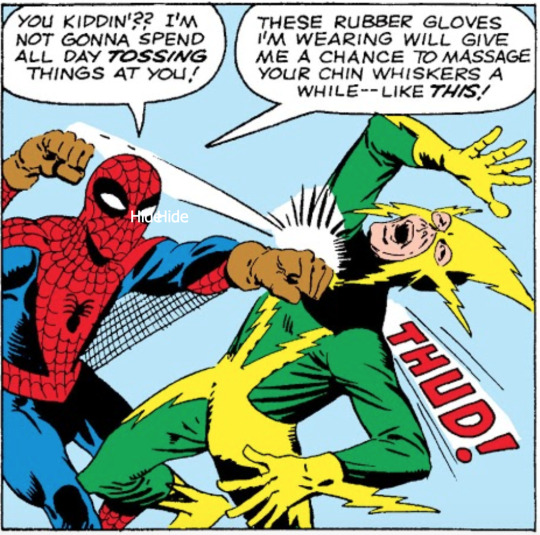

True Spider-Man trashed his original rubber suit for seemingly no good reason, but since this so aggressively makes no sense I think it’d be safe to presume Peter’s rationale was that the suit itself was ineffective (it didn’t provide full insulation) and was literally held together by glue. The suit was likely unusable after the battle hence why Spidey trashed it.
The four new identities he created though are the hardest to defend. It really doesn’t make much sense for him to have retired those identities beyond the simple fact that, well...the book is called Spider-Man not Hornet/Ricochet/Dusk/Prodigy. I suppose you could go so far as to say pretending to be other people and not using his web-shooters compromised his fighting abilities as he had to consciously move and talk differently as well as use different weapons and tactics. Also maybe he heard about how well multiple alter egos went for Moon Knight. The costumes were to be fair stolen from him and used by other people meaning he’d have had to come up with entirely new identities for himself and ultimately Peter would prefer being Spider-Man having come to see it (for all it’s burdens) as part of who he is.
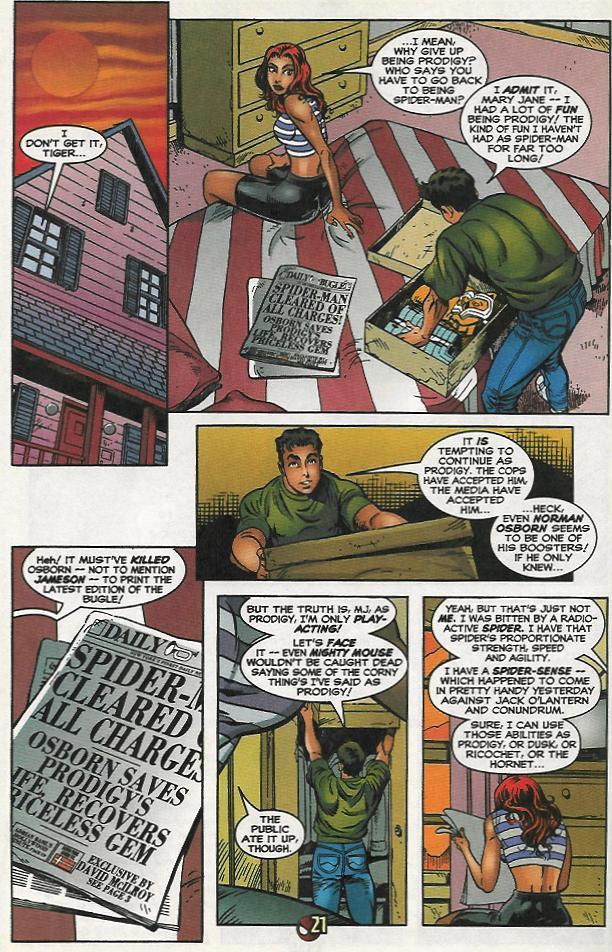
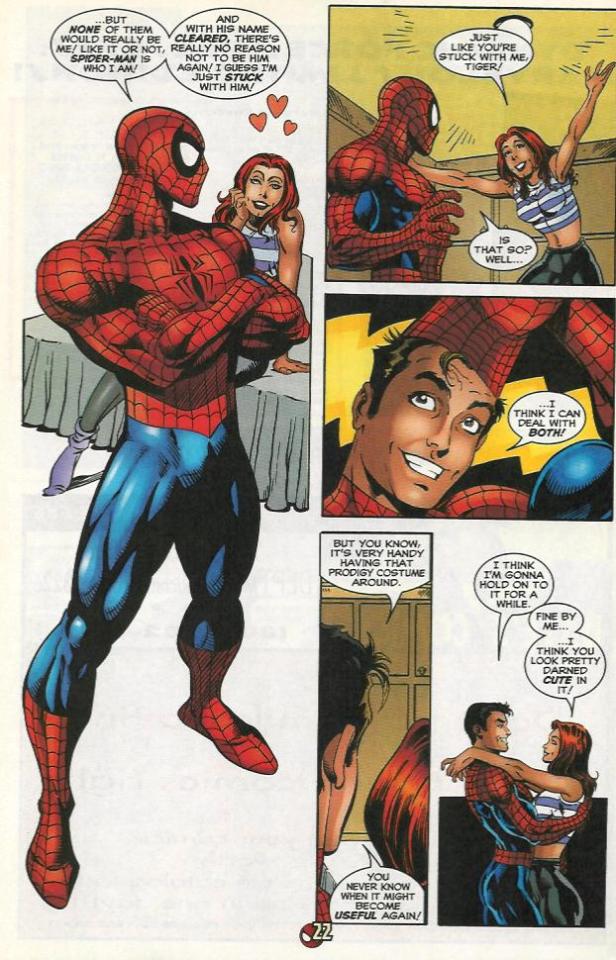
So contrary to Fettinger’s criticisms, Peter HAS changed his costume, but from a practical/functional point of view there really is little reason for him to permanently make any changes. Or else when he has done so extenuating factors have compromised his attempts.
Meaning all that’s left is Fettinger’s complaint that Spidey never changed the outward aesthetic. Which is not a legitimate complaint about his ‘unfulfilled’ potential. I’ve kept the same posters in my room for many, many years. It doesn’t mean I’ve failed in my potential. It just means I can’t be bothered to change them/I have grown attached to them.
Fettinger continues his train of thought by talking about how Spider-Man’s webbing and web-shooters have not significantly changed since his early days barring his adoption of organic webbing.
I will give Fettinger some leeway here. He never said the webbing/webshooters have remained totally unchanged, just that they’ve mostly remained unchanged. So stuff like Peter equipping a spider tracer trigger to his web-shooters, sedative stingers, impact webbing, an LED light to tell him when he’s low on ammo and adjusting the design and formula of the webbing over time I am lumping all under ‘mostly not changed’.
Even though objectively by 2006 the web-shooters had changed.
But again why does this demonstrate unfulfilled potential?
Spider-Man’s web-shooters are a brilliant feat of scientific engineering/chemistry and have served him well across the decades.
They didn’t need to be radically re-invented.
True, Ben Reilly found ways to improve upon them which Peter later incorporated. Does this not prove Peter was slacking off, of failing to live up to his potential?
Yes and no.
Yes because there WERE improvements he could have made.
But no because Ben had access to Seward Trainer’s scientific resources, less social responsibilities, a lot more time on his hands and was in many ways far less stressed out. As such he was better able to spend time dreaming up those improvements.
Said improvements by the way equated to wearing the web-shooters on the outside of the wrists, sedative stingers and impact webbing and he had FIVE years to dream all that up.
So you know...hardly him re-inventing the wheel.
The truth is if Peter had been in a similar position to Ben, he would’ve likely dreamed up the same improvements.
But he evidently didn’t need to since the web-shooters worked just fine. Ben himself didn’t spam the stingers or impact webbing during his career as Scarlet Spider or Spider-Man. Nor did Peter in the years after he integrated most of Ben’s adjustments into his own web-shooters.
And he did just fine most of the time.
Any further upgrading to his web-shooters, like the kind we saw in Parker Industries, would’ve required access to resources Peter simply didn’t have.
Fettinger continues that Peter’s relationship with the public he serves is tenuous at best.
Again, this is not an example of unfulfilled potential. This is the result of Spider-Man’s reputation being slandered by Jameson and the wider press getting in on the act. This was proven in ASM v2 #39 wherein Aunt May, decades after Spidey began his heroic career, attempted to find a newspaper that didn’t have a negative bias towards her nephew and struggled to do so.
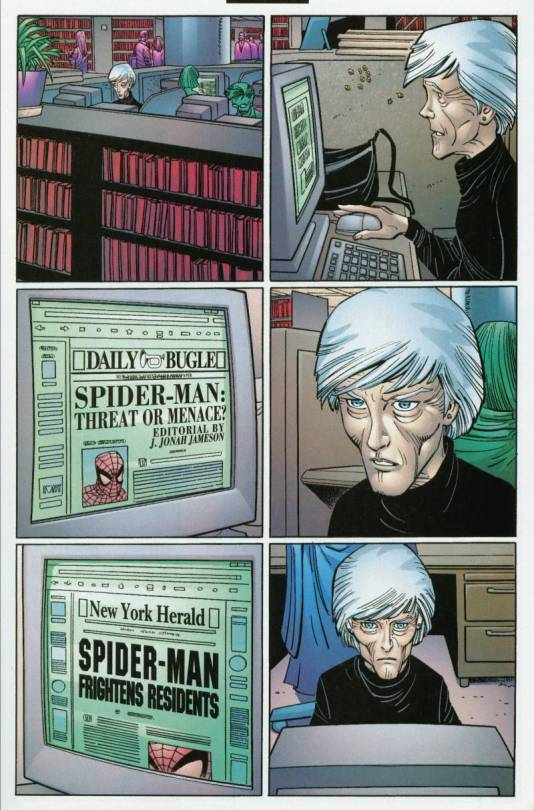
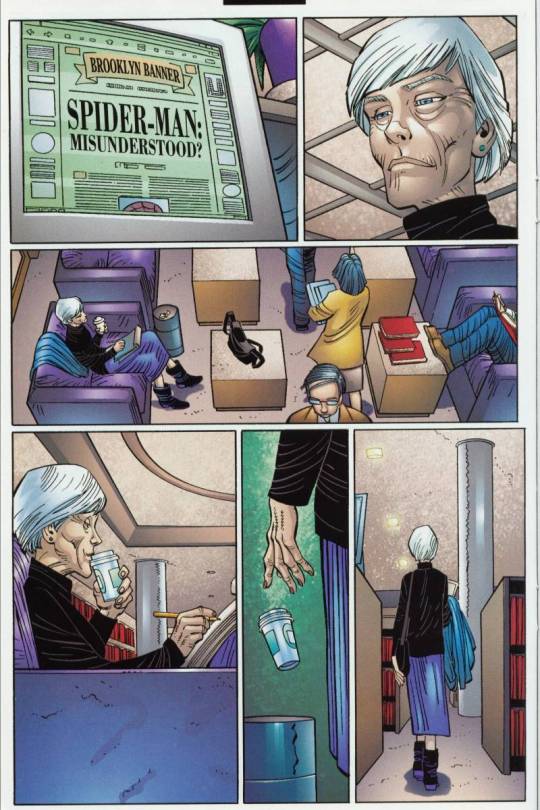
In New Avengers v1 #15 the Avengers attempt to win Jameson over due to Spider-Man’s involvement with the team only for him to turn on the team collectively.
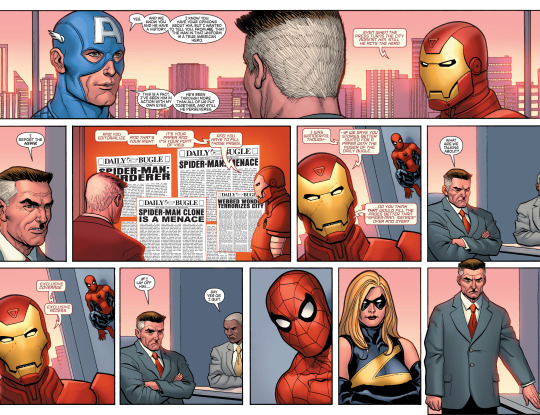
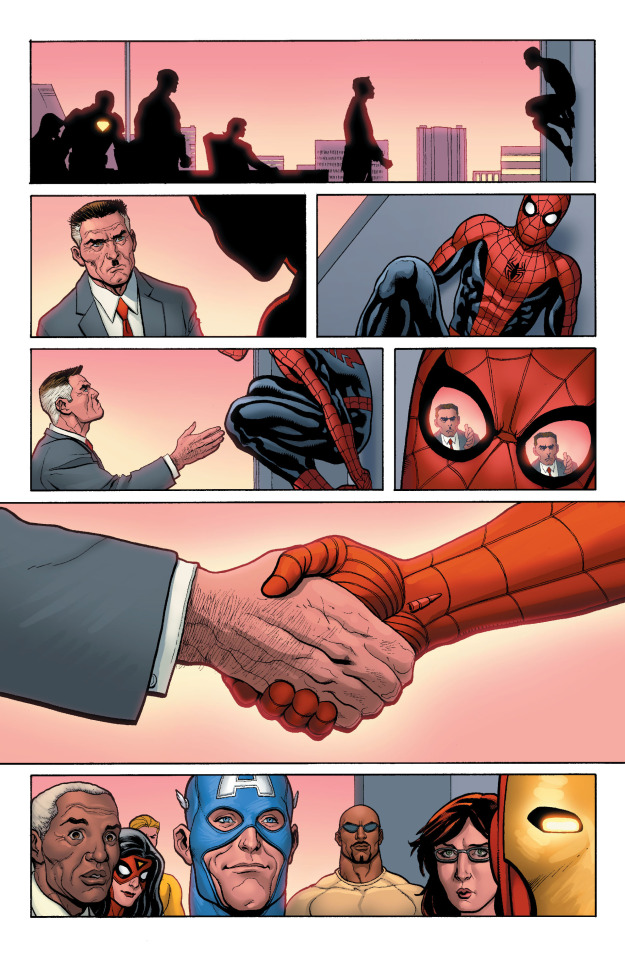
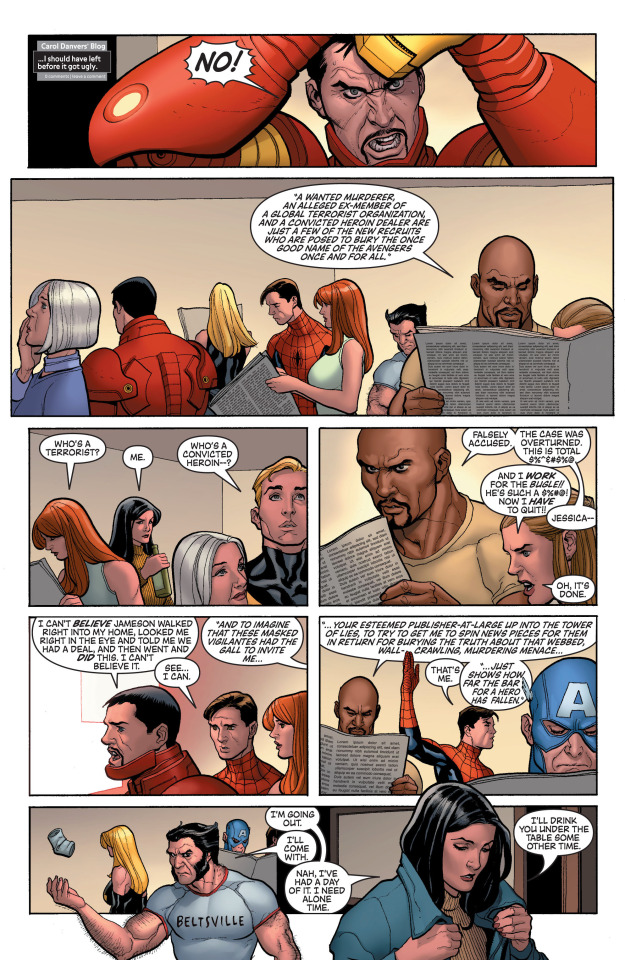
Combine that with:
a) The numerous times Spider-Man has been framed for crimes he was guiltless of
Or
b) The instances where he was deliberately painted in a negative light, such as when he assaulted a seemingly innocent Norman Osborn in Spectacular Spider-Man #250
And it was summarily not Spider-Man’s fault that in his 15 year history his public relations had never been great. Nor was it a negative reflection upon him that he’d been unable to improve them in that time
The public have been fed a particularly strong and buzz worthy narrative for so long that it’d be difficult for him to ever rehabilitate his public reputation without working for the authorities legitimately, being pardoned for any real/perceived crimes he’s been accused of and unmasking publically. Even then it’d be no guarantee.
Not to mention (though Fettinger could be forgiven for not taking this into account from a 2006 perspective) in the world we live in today it’s sadly apparent that news stories about how bad things are simply sell much more than stories about something positive.
Fettinger continues to say that in spite of Spider-Man’s dalliances with team membership his stubborn independence and feelings of inadequacies ensure he remains a loner and at times a fugitive with many heroes regarding him as poorly as the villains he fights.
This for me was possibly the greatest ‘what the fuck’ moment in this essay.
Stubborn independence. Okay, maybe? Although the message of his role in the then current ‘Civil War’ storyline was that surrendering his independence was a bad thing! By unmasking, surrendering some of his independence to Iron Man and working for the government Peter found himself in an inevitable position. He was trapped from doing the most good by a corrupt system. A system that was actively demanding he help do bad things by rounding up fellow heroes and removing their civil liberties. And in the process he made his friends, family, colleagues, students and general acquaintances targets!
Fettinger didn’t know this at the time, but in truth when you follow the chain of events, joining the Avengers is what led to One More Day.
If Peter hadn’t joined the Avengers and let them know his identity, Charlie Wiederman wouldn’t have gotten approval for his experiments from Iron Man.
If he hadn’t performed his experiments he’d have never become a freak.
If he hadn’t become a freak he wouldn’t have eventually burned down the Parkers’ homes.
If they hadn’t been homeless Iron Man wouldn’t have offered them Avengers HQ to stay at.
If they hadn’t been living there Tony wouldn’t have taken Peter under his wing.
If Tony hadn’t done that, if the Parkers weren’t beholden to him for the roof over their heads and if Tony didn’t know who Peter was, there’d have never been an issue about Peter unmasking publicly in support of the Super Human Registration Act.
If Peter hadn’t unmasked publicly Kingpin wouldn’t have put a hit out on his family.
If Kingpin hadn’t put the hit out Aunt May would never have been critically injured.
If Aunt May hadn’t been critically injured there’d have been no need for a deal with Mephisto to save her life.
Joining a team led to one of Spider-Man’s darkest hours and ultimately his greatest defeat.
So you know…maybe there is something to be said for ‘stubborn independence’.
Moving on…feelings of inadequacy? That’s heavily debatable. Again, see ASM #500. Peter was an ultimately happy person. He had a firm sense of pride throughout his life as much as he’d beat himself up. His inadequacies always came in the form of ‘I could/should have done more to help’.
Typically inadequacies manifest as ‘I’m just not worth it’. Even if you disagree and argue they are more like ‘I’m not good enough’ the context is still different. Whenever someone laments ‘not being good enough’, it’s almost always coming from a selfish mindset. Peter in AF #15 was frustrated about his inadequacies before going off on a power trip. But the older Peter’s frustrations were about his inability to do more for others! Superficially they might be called the same thing, but the internal psychology behind them is very different. Fettinger is attributing the former mindset to the latter iteration of the character.
It didn’t even really apply in the early years of the character. After all his problem in ASM #1 when he tried joining the Fantastic Four was about being too cocky (understandable given his age and experience as a performer) than about feeling himself to be somehow ‘not good enough’ for the team.
But then you get to the part here Fettinger claims these inadequacies and independent streak ensure Peter will at times be viewed as a fugitive. And that’s the point where I began to question near damn everything Fettinger has ever said about the character.
That’s not about Peter.
That’s the result of Jameson and super villains. If he wasn’t so independent or felt so ‘inadequate’ then I fail to see how that’d change his situation beyond other heroes disbelieving the news and vouching for him. But his various friends in the superhero community for many years never fully believed such slander anyway, especially since some of them had been victims of similar stuff themselves.
For instance, circa 1996 (let alone 2006) I find it fundamentally unbelievable that Daredevil or the Human Torch of all people would ever honestly entertain the idea that Spider-Man simply assaulted an innocent man in Spec #250 or (beginning in Peter Parker: Spider-Man #88) that he actually murdered low rent thug Joey Z (a crime Osborn framed him for).
More mind boggling though is Fettinger’s assertion that Spider-Man was (and always had been) a loner precisely due to his independence and inadequacy. This is utterly inaccurate because by 2006 Spider-Man was (to much consternation within the fandom) a member of the Avengers!
He’d been one for 1-2 years at the time of this essay’s writing and it’d been a MASSIVE deal. With hindsight we know that to some extent Spider-Man more or less held some form of Avenger’s status up until 2019, around 15 years after he first joined.
The idea of Spidey always being a loner was also aggressively contradicted by Spectacular Spider-Man #75-100. In those issues Peter and his girlfriend the Black Cat formed a crime fighting partnership. Yes they were lovers but the point is Peter was more than capable of accepting an on-going team arrangement. True their team fell apart with the end of their romance, but that had little to do with his independence or his feelings of inadequacy. Peter broke up with Felicia because she’d lied to him and didn’t value him beyond his Spider-Man identity.
That doesn’t touch on his independence at all and more importantly is an example of Peter doing something because he had too much self-respect to continue to be with someone who didn’t value him properly. Which is the opposite of things failing because he had issues of inadequacy.
Heck Spidey at one point tried to form his own superhero team, the Outlaws.
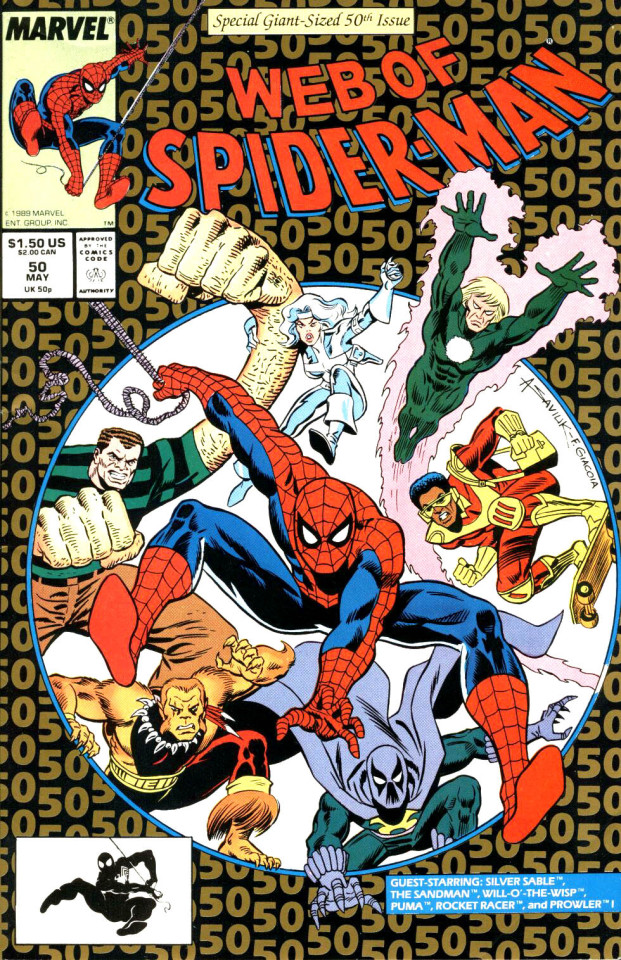
What’s worse is that Fettinger himself wrote a detailed essay about Spidey’s history as a team player.
I’ll leave it there for now. We’ll continue covering the introduction next time.
Master Post
#Spider-Man#Peter Parker#Avengers#New Avengers#Marvel#Marvel Comics#mjwatsonedit#Mary Jane Watson#Mary Jane Watson Parker#mj watson#Norman Osborn#J. Jonah Jameson#miles warren#George Stacy#Captain Stacy#Ezekiel Sims#Black Cat#Felicia Hardy#Aunt May#May Parker#Civil War 2006
10 notes
·
View notes
Text
shikuta @ lj on Why Ryo decided to leave Kanjani8
That edition of bunshun that came out this March has been proved to be 100% correct (from the timing, to the decision itself, to what he said) so it's not like there's much more left to say, just pieces to scrap all together. And this is my theory. The points bunshun made with that article have been: 1. Ryo wanted not to quit alone at first but to get everyone to quit KANJANI, the reason being the group not being able to keep up the usual the standards after what happened with Subaru and Yasu's situation; 2. Some members agreed on going hiatus, none of them on leaving; 3. Since that decision Ryo has been in bad blood with both Yoko and Hina, to the point of Yoko saying 'I can't work with that jerk anymore!' 4. The final decision has been made in March From now on it's just a matter of fixing our timeline using the infos we do know. 1. Subaru leaves, Ryo is the first one to regroup the members and decides to take the lead. He's still on board with having a six members group: plans an entire concert with six people in mind and even creates an extra for a single release. No problems in sight, tour still has to start. 2. Tour preparation is over and tour begins, we're around mid-September if I don't remember wrong. Ryo is is still on board with the band, does the majority of opening speeches, seems to have no problems to cover for Subaru simply by splitting his lines between himself/Yasu/Maru. Tour is at the beginning. 3. Around December/January (I suppose, since KJ8 clearly stated they had around 5/6 meetings about the issues and I like to think the split them in two months, at best) Ryo announces his decision to leave, to be official then in March. Six months have passed, so what could've changed? Directing that concert, that's what has changed. Many fans, and even Kanjani, talked about how both KJ8 and Ryo had different opinions about the direction the band should've taken, with basically KJ8 being 'yes' and Ryo being 'no'. None of them, however, even bothered to mention the reasons behind this point of views. If Yasu was fine and KJ8 had found a way to replace Subaru (as we saw them during during GR8EST) then why Ryo felt the need to split them up? Mind you that at first he didn't say he wanted to leave as a member, but that he wanted them to leave as a group, as a whole, while also keeping their positions in the agency. My best guess is that, while directing and organizing GR8EST he realized the limitations the group had to face due Yasu's condition and the astounding amount of stress they were putting on him. That's why the decision came midway the live and not before; that's why he proposed the group to quit all together, that's why (but I'll explain this later) he didn't even leave a note when he left. He realized KJ8 had nowhere to go without putting Yasu at risk and probably told the others 'well, that's it. We've already reached our peak, now let's quit before doing any disasters'.
And from this point on, hell got loose. According to the article both Hina and Yoko had ATROCIOUS fights with Ryo, with the two of them probably being in favor of keeping the band as it was and Ryo instead suggesting for them all to disband before it were too late. The fights kept going on and you could almost, barely taste them even during the varieties: during the whole year Ryo and Yoko almost never interacted with each other except when asked to; the last Telehone Game happened in January (back when he told them all his decision), after that no more. None of the two factions reached a compromise and so, by the end of march, Ryo announced his decision: not in order to go solo but to not betray his principles and part of the promise he made to Subaru. A band that keeps moving forward while sitting on the back of an ill guitarist should not exist. By the time Ryo left in September, KJ8 went once again against his suggestion of taking things slowly, and decided instead to start a 47 tour so improvised and desperate they didn't even have the venues booked per time. Ryo took this last blow and left without even a note or a sign of life on his jweb. This, in my opinion, also explain how does it come both KJ8 and Ryo gave almost no explanations or kept things vague at best: for KJ8 it would mean to admit they're trying to carry on while also overworking a man that is in deep pain; and for Ryo would admit spitting on the whole group. So, no press conference for them all together, really vague interviews to the point even Jin (Akanishi on twitter) pointed out how pointless they were and Ryo being out of the door in one day and with almost zero explanations. Honestly this seems to be the most reasonable explanation to me.
-
2nd reply by shikuta @ lj
Point is... members proposed to go hiatus. If you manage to get your hands on previous ANN episodes you'll hear Ohkura talking about how in the past, some members proposed to stop activities for a while. Some of them agreed, Ohkura included, some others did not. Ryo was certainly in favor. One of the first Boku, actually, had Yasu talking about concert preparations for GR8EST, how at some point he told to the members, crying, that he didn't feel like he was up for this tour, that he didn't want to take any part on it. Again, some members agreed on stopping this carousel, Yoko and Hina did not. Tour was made. So, it's not like Yasu's opinion held really any value in this particular stance: deciding whether to put a group on a stop is a decision that the band as a whole should made. Ryo tried to get them to this point, considering Yasu's health, two of them were deaf apparently and decided to carry on, hence Ryo had enough and left. It's really simple as that. Because, let's be honest here, Yasu is not fine, will never be fine. Don't let J&A fool you, they're going to work this horse to the death. It's been two years since the surgery and he still does experience both phono and photophobia. Can't sit on an hard chair without a cushion. Had to drop scuba-diving. The network has been forced to change a lot of Chronicle segments simply because Yasu wasn't up to the task anymore: no more long walks for the 'looks like this/is like that' segment, no more Dodge Game, no more Ikemen Camera. They put, instead, segments where he can sit and talk, like the cuisine one or the manga panel or the one with guests talking around a table. All those moments you've seen during concerts, the so called 'Yasuda Moments' are simply speech impediments, him forgetting words, confusing similar sounds. 'Post surgeries moments' that still affects him and probably will never entirely leave. All of this would pose no treat for your average office worker that is back to work after a year of rehab. But for a machine that is programmed to jump, to sing, to run, to play, to move from one location to the other, months after months, your doc's definition of 'fine' holds no meaning. Yasu knows that, Ryo knew that, Yoko and Hina knew that, the youngest ones knew that as well.


We're one year post surgery and three months after personal hiatus when this happened. The man that according to KJ8 and the agency is 'fine' has even trouble to carry the weight of his own guitar. Has to move, take a deep breath and relax shoulders in order to dissipate the pain. Ryo's eyes, trained on him, notice all of this and take a mental note to tell others to slow a bit. KJ8's response, the day after he leaves, is a simple 'fuck it, we going touring again you asshole'
76 notes
·
View notes
Note
All right, you have officially sold me on Bobby Drake. Where do I start reading?
Its a good question, lol! Honestly, it mostly just depends on how far back you want to go. I mean, he’s been around for sixty years, lol, so there’s a shit ton of appearances to wade through, and it depends on how familiar you are with the X-Men as a whole.
If you’re not familiar with the X-Men or Marvel in general, this is actually a really good time to jump in with reading the current books without much prior knowledge. Just last year the X-books underwent a huge status quo shakeup in the two limited series House of X and Powers of X, that pretty much like....transformed their entire place in the Marvel Universe as a whole and gave them a whole new playing field that was all pretty clearly laid out within just those two series. So its a really good starting point to kinda catch up quick to where things stand now and then just branch out from there to whatever catches your interest.
Bobby’s a main character in a book called Marauders currently, which is only on issue #6 or #7 right now, and the book is pretty central to the major happenings in the X-Men’s corner of the universe. Plus a lot of great characters in the rest of the cast - Storm, Bishop, Emma Frost, etc.
If you want to start from way far back and have a good long, consistent read, the original X-Factor (the first series, vol 1) is where I would go. I don’t think anyone really needs to read the original X-Men series from the 60s to get a handle on the characters or universe, and personally I’ve always found X-Factor a much better read using all the same characters except with the added bonus of no Xavier. As he is. The Worst.
Between the original X-Men run and X-Factor’s debut, Bobby, Angel and Beast popped up on various other superteams, like Bobby and Angel were on the Champions together for a bit, and then the three of them were on a team called the Defenders for a while...if you can find old Defenders issues online (this would have been back in the 70s/early 80s), they’re worth checking out just for Bobby’s brief romance with a shapeshifting character named Cloud who he first met as a woman but later shifted into a man. And while they decided to just be friends at that point, given that this was the era of the Comics Code when gay relationships were ‘frowned upon,’ this was the earliest and most blatant gay-coding of Bobby, literal decades before he was made canon gay in the comics. Plus, they’re just pretty fun stories and Bobby and Cloud were super cute together.
But yeah, then X-Factor ran for a number of years without interruption, staying consistent with the same core cast of just the original five X-Men and the supporting characters they introduced in that series, like Rictor (another future famous gay X-character, just a wee punk teenager at the time, lol). It was pretty fun overall, IMO, should give anyone new to the Marvel U a pretty solid grasp of all the major players in it, and its where a lot of big names like Apocalypse made their debut. And of course, I think Bobby was well written throughout it. X-Factor was also where a couple of the things I mentioned in that post happened, like the storyline where Loki kidnapped Bobby to use his powers to make his army.
After that.....basically, the original X-Men left that title to rejoin the X-Men when Marvel relaunched the X-Men line with a brand new X-Men #1 in the early 90s....and at the same time, they kept the already existing Uncanny X-Men title going, which was around #280 at that time.
Since they had such a huge cast of characters at that point, they split the X-Men into two fairly iconic lineups, the Blue and the Gold....the Blue team were the chronicled in the adjectiveless X-Men book, and featured Cyclops, Gambit, Psylocke, Beast, Wolverine, Rogue and others, while the Gold team were the main characters of the continuing Uncanny X-Men title from again, around #280 and onward. The Gold team was Bobby, Jean Grey, Colossus, Storm, Archangel, and then later Bishop as well, etc.
This era was where a lot of the best Bobby stories took place, IMO. Very early after the Gold team was formed, Bobby had a mishap with Mikhail Rasputin, the older brother of Colossus, whose powers shifted Bobby into his organic ice form for the very first time, where he became living ice that he could control and shapeshift and heal, rather than just cover himself with ice. This was the beginning of them exploring the versatility of Bobby’s powers and what eventually led to them making him an omega level mutant, though even back in X-Factor they’d established that he was far more powerful than anyone had realized before that.
Then Uncanny X-Men #311 continued this and launched one of the most pivotal periods in Bobby’s development. An accident led to a comatose Emma Frost’s mind jumping into Bobby’s body and taking control, and she used his body and powers to seek revenge for the deaths of her own students, and in the process pushed his powers even further than anyone had thought possible. This is where he came to realize he could literally teleport by melting into any body of water and recreating himself anywhere else connected to that body of water, like traveling from one end of a river to another, or even across oceans instantly....as well as proving to him that he could literally get holes blown in his ice form and just fill them up with new ice and transform back into his flesh and blood self, none the worse for wear.
This period also led to him showing up in Generation X a lot, where Emma became one of the teachers for that generation of young mutants, because during this time, Bobby and Emma like....clashed a lot, because Bobby had a lot of issues about her hijacking his body and then taking it on what was essentially a suicide run at the time, and was also resentful of her being instantly able to do things with his powers he hadn’t even conceived of with years of training with them, and Emma was....prickly at the best of times, back then even moreso than now, so she tended to taunt him with this and push his buttons by insinuating she knew more about him than he did himself, and she knew what really was holding him back all these years, etc, etc....but then they eventually formed a very unconventional but real rapport, and decades later, they still have this weird thing where they’d probably never admit to even liking each other, but they probably respect each other more than just about any other of their teammates combined. (Also, the Christian that Bobby is currently with in the comics is Emma’s older brother).
Back to Uncanny X-Men....to take his mind off of everything that the body-jacking by Emma had brought up for him, and because Rogue was having a lot of similar issues due to her new relationship with Gambit and the glimpse of various secrets of his that she’d gotten via her own powers....Bobby and Rogue decided to take a road trip together, that went on for about a dozen issues all in all, and are some of my all time favorite Bobby stories. This includes Uncanny #319, where they go visit Bobby’s parents together and Bobby tells off his dad in epic fashion (this was literally the first comic I ever read, and still one of my faves today, lol....also he made a giant ice palace off the coastline that was as big as a city and that has nothing to do with anything except for the fact that it was very pretty and very gay. Foreshadowing!)
Then there were a couple of big iconic crossover events that took over all the titles for awhile - the first was the alternate universe Age of Apocalypse event - and its worth tracking down and reading in its entirety, IMO. Definitely one of the most pivotal ‘events’ in Marvel history, but it was actually pretty good, too? LOL. And the Age of Apocalypse version of Bobby was pretty bad ass. (He returned in Rick Remender’s X-Force title about fifteen years later, but we don’t speak of Rick Remender or that return, for both are bad and wrong).
Then reality was restored, and the Onslaught crossover happened, and like.....really the only thing you need to know about that is its basically where the entire Marvel Universe teamed up to fight the evil brain baby slash hatechild of Professor X and Magneto. I’m just saying. Read it at your own peril. I’m not even saying its BAD, I’m just saying. Read it at your own peril.
Then in Uncanny X-Men #340.....that’s the issue where Bobby left the team for awhile to take care of his dad after he was almost killed at that hate rally I mentioned in one of my Bobby posts today, so I forget where the whole ‘going undercover in Graydon Creed’s campaign’ storyline started, but back up a bit from there and you’d be good to go. He and Sam (Cannonball) went undercover together and that was basically the start of the epic Bobby and Sam bromance slash subtextual romance that I still love to this day, too.
Then he was out of the books for awhile, off taking care of his dad, and didn’t really return until this big event called Operation: Zero Tolerance happened, wherein the government went after the X-Men directly and captured pretty much all their big guns, and Bobby came back to help and had to single-handedly rescue a bunch of random mutants from Sentinels and make an interim team with which to like, save the day themselves. O:ZT is actually a really good story for him, I really like how competent he was portrayed there, and also it was the introduction of Dr. CeCe Reyes, who is also a fave. She was also briefly a sorta/not sorta love interest for Bobby, that of course didn’t ultimately go anywhere. On account of, y’know. His Massive Gayness.
Then Bobby left the team again to go return to taking care of his dad, and also because certain writers hated him (though tbh, Bobby’s actually one of the longest running heroes in the Marvel U, as in....he’s spent the longest consecutive times active in various books/teams without taking breaks, compared to pretty much all other characters who aren’t Wolverine, Captain America or Spider-man. He was a constant presence in books pretty much from his creation up until the mid-90s, so like, he was due for some time-off. I GUESS. WHATEVER).
From this point, he didn’t return until a storyline called The Twelve. It was very bad, and very dumb, and you should not read it. Your brain cells will thank me later.
Then there was a miniseries called X-Men Forever - this you SHOULD read, as its where the term omega mutant was essentially coined for the first time in the way its been used ever since, and its where both Bobby and Jean found out they were omega level mutants for the first time. And Mystique and Toad and Juggernaut were also there because....idk, tbh. That was all very strange to me. But! Still! Worth a read!
Then came a veeeeery underrated Iceman solo miniseries of four issues, that is weird but also very worth tracking down as it was a great Bobby, very poignant and also kinda sad, but like. I’d highly recommend. Especially as it was pretty much the last good Bobby for awhile, with the exception of Joe Casey, who wrote a decent Bobby but a terrible Everyone Else.
Then we enter the Dark Ages of Bobby. Where everything is bad and all the writers are the worst.
First up is Chuck Austen. Bobby was a core member of his X-Men lineup, throughout his run. This is not a good reason to read Chuck Austen’s run. Do not read Chuck Austen’s run. You’re welcome.
Then there was Peter Milligan’s run. Peter Milligan’s run was not as bad as Austen’s run. This is not a good reason to read Peter Milligan’s run. Do not read Peter Milligan’s run. You’re welcome.
Then Mike Carey took over. You CAN read Mike Carey’s run. You probably even SHOULD read Mike Carey’s run. He is not perfect, but he liked Bobby and we like him for liking Bobby. His Bobby actually spoke in complete sentences and displayed more than one emotion per issue. And Supernovas is a pretty good arc and was actually where the Children of the Vault were first introduced, and they were just brought back in the most recent X-Men issue to be a recurring antagonist, so they’re like. Relevant and stuff.
And then there’s Messiah Complex, which is basically the Advent of Oh Hai, Everything’s About To Get Just Fucking AWFUL For Mutants From Here For the Next Ten Years Or So, and there’s like....blechness with Bobby and Mystique, which...I mean....all else aside, she’s Rogue’s MOM, but WHATEVER. Look, there were....plot reasons. Kinda. So. Whatever. Just blink rapidly and move on from that as quickly as you can.
You can pretty safely jump ship at that point, because Divided We Stand is No, Second Coming is Ugh, and Schism is Why. And also there’s Age of X in there somewhere, which is to be avoided because Age of X basically just wanted to be Age of Apocalypse and its not Age of Apocalypse. Just like Age of X-Man is similarly not Age of Apocalypse, and even Age of Apocalypse 2.0 is not Age of Apocalypse. Stop trying to be Age of Apocalypse, everybody. NONE OF YOU ARE AGE OF APOCALYPSE.
You may have one (1) year of Marjorie M. Liu writing Astonishing X-Men, as a treat. She wrote a great Bobby, this was where the whole ‘freezing the whole Earth, whoopsie’ thing happened, and it was a great and very underrated story.
Then post Schism there’s stuff like Wolverine and the X-Men, where Bobby’s a main character after being lured to take Logan’s side in the Schism instead of Scott’s, with the promise of Being Relevant. ‘Twas a lie. Bobby ‘twas there, but hardly relevant. And Jason Aaron is not as good a writer as advertised, since he’s mostly the one doing the advertising and like.....dude should not trust his own hype. There’s weird and whimsical, and then there’s just plain WEIRD, and most of Wolverine and the X-Men is the latter, claiming to be the former, and like. You can’t trust anyone these days.
Then comes the Era of Bendis. Die, Era of Bendis, Die.
Do not read the Era of Bendis. Do not speak of the Era of Bendis. If the Era of Bendis bursts into flames on the street next to you, look pointedly away, and trip anyone who runs up to try and douse the Era of Bendis with a bucket of water.
Just trust me. The Bendis, and then the Hopeless (that’s the name of the actual writer who took over on All New X-Men, but it pretty well sums up the feelings of Bobby fans on the matter too, ‘twas fate), and then the Bendis again....bad, bad, bad and also Superbad, but not the movie.
You will hear promises, siren songs, of a young, teenage time-displaced Bobby Drake having his first boyfriend, an Inhuman named Romeo. THIS IS A LIE. ITS A TRICK! A TRAP! DO NOT FALL FOR IT!
Basically everything is blah blah blahful for awhile....until the Bobby solo series by Sina Grace, which gets a bad rap, but I maintain its worth the read. Like, I’m not going to call it my favorite take on him or anything like that, but its still good fun and a vastly more competent and compelling Bobby than anything Bendis ever eked out.
And that basically catches us up to the present, where we’re at with Marauders.
So!
There you go! Umm....this was supposed to be just a brief list of arc titles to check out, but then I went and hyper-fixated like a BUFFOON, so....umm. Yeah! Have at it!
10 notes
·
View notes
Note
I am reading you new story Beloved. In the latest chapter, I don't understand the hostility between Hermione and Jones. Did you have another story where there back story or history is explained. Thank You.
Mornin’ Nonnie. Coffee is brewed in the kitchen.
TL;DR answer: - Read Ch. 16 of Ron Weasley Chronicles.
Long answer under the cut below because it’s long and spoilerish for Beloved and other fics in my entire Nicheverse.
Hemera Octavia Jones is an OC of mine. She’s s statuesque at 1.85M, dark brown skin, unapolgetic in being cometent to the point of arrogance, unabashedly Bisexual (*in a relationship with Aurora Sinestra, Astronomy Prof at Hogwarts, whom she met when she was DADA professor in the 1998-1999 post-war term), best friends with Kingsley Shacklebolt (even if she is a few years younger), cousin to Hesetia and Gwenog Jones, and 1983 graduate of Hogwarts (Hufflepuff House)
She’s much like how Okoye is written for the film adaptation of Black Panter - but that was purely accidental on my part, considering I’ve not yet watched it and wrote Jones before the movie came out (nor have I read the first comic.)
I wanted someone who was a force of nature and much a foil for Hermione, like another wing of the same bird with similar goals.
She started in the program right out of Hogwarts, having Gawain Robards and Kingsley Shacklebolt as Seniors (and later, Moody, too, before he retired.)
Her first and only year at Hogwarts (which is in a half-written Yr 8 fic focusing on the friendship of Hermione, Ginny, and Luna while the guys are off being Aurors) was wrought with problems, most of them caused by Hermione Granger. Jones, though, also saw so many of Hermione’s weak moments, the ones where she lost her temper, had PTSD flashbacks, nightmares, and other mental health problems. Admittedly, Jones also protected Hermione, sometimes from herself, and from additional scrutiny from others and outside influences, so she would have a chance.
Hermione never realizes that until much, much later on.
(This is also when we get a better introduction to Audrey Reeves (who is later Audrey Weasley but that’s not what you asked.)
Jones and Hermione knock sparks and will for a very, very long time. Hermione can’t drop the grudge from that first year and Jones takes great pleasure in antagonizing her, because Hermione is so passionate but it’s also a weakness because others can possibly control her by being emotional. (Yes, I realize it’s a toxic trope idea and anti-feminist but it’s also something that women get from other women sometimes, myself included. Thus, while problematic, it’s also realistic.)
But here is the ultimate relavant section from Ch. 16 for you:
“Go on. I’m listening. I figure that after the last coupleof days, I should listen to my mistakes so I can learn from them. You’ll alsonot sugar coat anything for my benefit.”
Hermione leaned against the door. “I don’t know where yougot the idea that we’d be friends from the first day. I don’t know why youpresumed that I would be so open and trusting with someone I didn’t know. Noteven Professor McGonagall can force that. But,” Hermione stopped and she sawHemera nodding, “But when you were teaching us, you were so bloody mental. Youdidn’t listen to anything the survivors were telling you. Because you are anAuror, you taught the class like no one else had gone through anything worsethan taking our OWLs. Everyone in your classroomof seventh-year students had been throughhell, one way or another. Yet you treated us like first years that didn’tdeserve to be out from our Mum’s apron strings.”
“I had a task, Granger. The Minister wanted you in the AurorCorps and we needed the help. He thought you would be an amazing asset. I wasalso there to see if anyone else had the aptitude for it. When you’re down to12 Aurors from 100 because of the culling and the Coup, you take what mightwork.”
Hemera winced while shifting in her bed. “But there wassomething else, something personal. Ron let it slip that you attacked him onetime, with magic. He explained what happenedwhen he was first assigned to me as a trainee. He tried to say he wasresponsible for it, and I know that’s bullshit. But it caused a huge problem.Do you want to know what that was, and what happened as a result?” Hemera’seyes flashed. “No matter how hard I worked him, insulted him, belittled him, orhumiliated him, he wouldn’t raise his wand against me. An Auror who won’tdefend himself is useless to me and will probably get a whole team killed. Nomatter what I did to him, he wouldn’t raise his wand against me. He’d have noproblems with the other Seniors in training. Butme, a woman? He said he couldn’t do it, ‘cause of what you did to him.
“Do you know how bloody long it took me to re-train Ronafter that incident? It took a month of daily training; a month of wasted time,all because you got shirty he went and kissed another girl ‘cause you couldn’tpull your finger out and tell the bloke you fancied him.”
“I couldn’t afford to lose him as my best friend!” Hermioneyelled. She looked and saw Harry roll over in his bed and Ron shift but wentback to snoring. “I didn’t know and you never said.”
“I was too busy fixing your mistakes, mistakes you neverbother to apologize for. Hell, even I can say I’m sorry and I’m as much of an arseholeas anyone. But you? Ron casually mentions off-hand that he has to back downwhile rowing with you, and apologize anytime that you think he’s wrong. The fewtimes he’s stood up to you and tried to tell you when he’s feeling less thanstellar you bite his bloody head off. Fuck, he has zero pride when it comes tostanding up for himself, because you and Potter never once tell him that he isright about something.”
“That’s impossible. Ron never backs down from a fight,especially with me.”
“Isn’t it? You weren’t there seeing him constantly beingknocked on his arse because he wouldn’t raise his wand in self-defense. Whensomeone you love attacks you with magic it is a hard betrayal to overcome. Butsomehow he did but the consequences held him back until he pulled his head outof his arse and raised his wand to me and fought back like you finally did. It took me dropping my wand and tellinghim that he either raise his wand to me and fight back or I would personallykick his arse out of the program. I berated him in front of everyone andbelittled him to the point he slugged me before walking out.”
“Good for him,” Hermione muttered. “I would have loved toslug you myself some of those days.”
“Things would have gone swimmingly for you had you tried,Granger. You might have gotten over your fear and made something of yourself,for the Auror corps.”
Jones had a secondary task: recruiting for the Aurors post-war. Hermione was who they wanted, just as much as Ron and Neville and Harry. But her post-war time (years, really) was filled with much mental health distress, such as ptsd, anxiety, sleep deprivation from nightmares, and a short-term sleeping draught potion addiction (where sleep was vital but also a co-morbidity to depression, too.)
They knock sparks but Jones also had to re-train Ron to be who he needed to be, as an Auror. While Viv has mentioned in her public and private meta that Ron needs praise and encouragement and positive support, Jones didn’t know that and didn’t do such until after he would be willing to stand up for himself. Once he did/does, the relationship changes for the better, even if it appears to be negative.
For the relationship with Ron, it’s about self-respect. Once he has that, Jones can respect him too, even if she disagrees. Admittedly, that’s one of my not-necessarily positive traits. O_O
So when I write this, it’s a case of breaking a bad habit and rebuilding a new one. When you break someone, it’s your personal responsibility to rebuild them. That takes patience, determination, and giving a (dung) about their welfare and well-being. That’s what Jones did here - which Hermione never realized that it was for his own safety and benefit.
Yes Ron is soft-hearted and so caring but he had a job he wanted to do and was incapable of doing it if he wouldn’t stand up for himself and others. Once he decided to do such, his career took off.
It’s only years later that she sees Ron and Harry as peers, along with Hermione, but it’s that she has trust issues and can’t get too close because Aurors get injured, maimed, and killed in their profession. Once she realizes that she can get close to them, as a peer and as a friend later on, the relationship blooms for everyone, including Hermione.
So nonnie, if you read this far, congratulations. Now you know why Auror Hemera Jones is vital in my nicheverse.
#Anonymous#Dragon asks#Dragon listens#Dragon speaks#Dragon talks XXX#Dragon talks OC Hemera Jones#and why she is vital in my nicheverse
7 notes
·
View notes
Text
September 2018 Book Roundup
If you’ve read any of my posts you probably know that I have high-functioning depression and sometimes dip into episodes that are worse than the rest of the time, and I’m definitely dipping into one! Which means that it’s getting hard for me to focus on anything, including reading. :( But I did read some good books this month! The high of September book-wise was definitely Kendare Blake’s Two Dark Reigns. If you haven’t tried her Three Dark Crowns series yet, please do. It’s very, very good. Hopefully, October will be full of dark and creepy reads!
Mirage by Somaiya Daud. 4/5. Amani is a farmer’s daughter, her people dominated by the brutal Vathek. On the night that she’s to reach her majority, droids descend and take her to Ziyaana, where she discovers that she’s the double of the selfish and cruel Princess Maram. As Maram--born of a Vathek conqueror and a native Andalaan mother--is hated by her people, Amani will be trained to be her double, standing in for Maram at important events. There are two problems: for one thing, Maram’s fiance Idris connects more with Amani than he does the princess. For another, Amani’s proximity to the crown makes it all too easy for her to become the target of rebel plots.... This book has a lot of atmosphere, and is inspired by Moroccan culture. It’s firmly sci-fi, but feels very fantastical in a lot of ways. The most important and compelling part of the novel--besides the general world--is the relationship between Maram and Amani. Maram is truly awful, but she’s also truly human. While the main romance is a bit meh and the climax doesn’t feel like much of one, it’s an entertaining book and I’m look forward to the next installment!
Toil and Trouble ed. Jessica Spotswood and Tess Sharpe. 4/5. A collection of short stories with one thing in common: witches. This a nice anthology, with all the urban fantasy your heart could want. There’s a good bit of representation--Latina witches, black witches, gay witches, bi witches, I *think* some trans man rep though it wasn’t very explicit so I can’t say for sure. My favorites included Afterbirth by Andrea Cremer (a good, old-fashioned Salem witch trials type of story involving a midwife’s apprentice, a dead patient, and a mysterious baby), The Well Witch by Kate Hart (think like... a shoot ‘em up western but with a part-Comanche witch at the center) Beware of Girls with Crooked Mouths by Jessica Spotswood (about a witch trying to trigger a vision she saw in which she and her sisters survived a curse on their family) and Love Spell by Anna-Marie McLemore (about a bruja who falls in love with an acolyte--so romantic and so very good, McLemore is an amazing writer). A great read for Fall.
Two Dark Reigns by Kendare Blake. 5/5. The third installment of the Three Dark Thrones series sees Katharine on the throne and Mirabella and Arsinoe hiding on the mainland. Fennbirn is caving in on itself, the mist meant to protect it striking out against its people--who, in response, grow hostile to Katharine. Meanwhile, Arsinoe is being sent visions from the Blue Queen, a legendary ruler of Fennbirn whose ghostly presence may spell disaster for the island. Kendare Blake knows how to write spooky shit. She knows how to write sad shit. She just knows how to write. I never want to leave the world of this series. This book was actually better than the last, expanding on the intrigue and mythos of the world. I still don’t love Jules, and I really don’t really like more recent addition of Emilia--but their storylines are compelling, and I love Katharine and Mirabella and Pietyr and Bree and so many other characters enough to overwhelm the characters I’m not as big a fan of. This book left me dying for the next.
Tear Me Apart by J.T. Ellison. 4/5. Teenage Mindy is an up-and-coming champion skier, looking to qualify for the U.S. Olympic team. After she breaks her leg, it is revealed that she has leukemia, sending her loving parents, Lauren and Jasper, into a spiral. The only hope they have of saving Mindy’s life is through a stem cell transplant--but when Lauren and Jasper are tested, it’s revealed that neither of them are biologically related to Mindy. This is a fairly dark thriller that doesn’t simplify the issues it discusses, and certainly doesn’t pull any punches. Will you see the twists coming? I did, though not immediately. But that’s okay, because it was less “failure to twist” and more “something set up pages ago paying off”. The book was a bit long and padded for the story it told, but I have to say that I loved the ambiguity of it all.
Queens of Fennbirn by Kendare Blake. 4/5. These two Three Dark Crowns novellas are bound together in one edition--The Young Queens tells the stories of Mirabella, Arsinoe, and Katharine before Three Dark Crowns begins,during their childhoods; The Oracle Queen explains why oracle queens are drowned at birth, through the story of the “mad queen” Elsabet, who allegedly murdered innocent people based on her visions. I’m not surprised that The Oracle Queen was more to my taste, just because I want to know the backstories of literally every queen in this world... (I mean, I’d take a companion book chronicling every queen in this country... easily.) But The Young Queens was still a well-done story, and added a lot to how I see the world of the series. A must for fans of the books.
Rule by Ellen Goodlett. 2/5. Zofi, Akeylah, and Florencia (”Ren”) all come from vastly different backgrounds. When King Andros summons them to palace, it’s revealed that not only is he dying, but that all three are his daughters, and the only potential heirs he has left after the death of his only son. The girls are thrown into court politics and training, though Andros can only select one to be queen. Each one has a secret, and someone is out to expose them--so who will come out on top? Basically, I loved this idea and the execution was beyond blah. The politics were way too light. The magic system was cool, but not enough to save it. Relationships were shallow. Romances were dull. Very little time was spent on the idea of the girls developing relationships with Andros OR each other. Again, the world was interesting but the characters didn’t work.
Wildcard by Marie Lu. 3/5. After discovering the truth of Hideo’s plans, Emika is set against the man she fell in love with. As she seeks to take Hideo down, she gets drawn into the world of the mysterious Zero--the only person who can protect Emika now that a bounty’s been placed on her head. Aaand as this is a sequel, saying anything more would mean giving away big spoilers. I loved Warcross, which is why Wildcard was a bit of a letdown. Honestly? It felt like Lu was trying to cram two books into one. I thought I’d see more of Emika trying to take Hideo down, and the push-pull between them that I frankly loved in the first book. The truth about Zero’s past? Very compelling. The ending? Kind of anticlimactic.
Not Even Bones by Rebecca Schaeffer. 3/5. Nita dissects unnatural creatures so that her mother--usually their killer--can sell them on the black market. Unicorns, mermaids--Nita has dissected everything, though she herself isn’t all that natural thanks to her ability to heal herself. After her mother brings home a living boy with the intention of cutting him into pieces, Nita suffers an attack of conscience and frees him. She wakes up at the Death Market; once a part of the trade, she’s now for sale. A lot of 3 star reads kind of bore me--this one didn’t. It was super engaging. The concept is super cool, and I want to see more of this world. Nita’s relationship with her parents, and particularly her horrifying mother, is interesting. I’m happy with the grayness of this world. It’s just that the writing is a bit awkward. There are a lot of creepy grins described over and over. Nita’s seemingly cold nature isn’t described very well, to the point that what should come off as human hypocrisy that she learns from reads more as self-righteousness, especially regarding one plot twist. One thing did distract me a bit--a creature that essentially gets off on pain and is thus a great torturer. Technically, they feed on pain and therefore must torture people to live, theoretically. One: these creatures are treated as super valuable in organized crime families, but I don’t really get why they’re needed as skilled torturers exist already. Their powers are vague. And they’re called zannies? I don’t know if these are obscure magical creatures I don’t know about, but to be honest if they are the author needed to use another name. Zannie/xannie is slang for Xanax. That always popped into my head when they were mentioned, and it was very distracting. It doesn’t ruin the book, but it is kind of weird to me that nobody caught that in the editing process.
10 notes
·
View notes
Text
A Tale of Three Toms
(aka, how they butchered everything to save this guy)
(anti-tom)
Just a brief chronicling of the different versions of Tom’s story.
Season One: Who Does He Work For?
I think the original plot outline went something like this -
Red realizes something is up with this guy in Liz’s life. He gets wind of passports under false names, etc… He realizes this guy is attached to one of his enemies. But he can’t bear to just take him out because Liz is so in love with him and happy.
In their initial ideas for the pilot, they thought of scenarios where it starts with Red killing Tom, then coming in and revealing everything later, post-death. But they clearly decided that letting him live and revealing it more slowly over the course of season one was more interesting. And I think it was.
But they needed a reason then that Red wouldn’t just outright kill him, so they had the ‘well Liz loves him and Red can’t bear to hurt her’ excuse. Which I never thought was adequate, but whatever. That was their way to keep this war going through season one so there could actually be a war in season one.
So after doing as much as he can on the outside, Reddington surrenders and works to expose her fake husband and use the FBI to smoke out his employer. He doesn’t count on Liz stubbornly refusing to see what’s in front of her face. He figured they would work together on this. He fully intends to end Tom once his employer is known, and that part pretty much holds up. Once Red knows about “Berlin” he goes to put a bullet in Tom.
There was also talk of killing Tom in 1x17, but I’m not sure of the context of that. Apparently they decided to wait until the last episode.
So it started out as an excuse really to get Red back into her life. To have a show. Some enemy of his has gotten so close to her that Reddington can’t stay away any longer. She’s in peril without knowing it and he has to be there.
For Liz, it’s a story about shattering that little fake life, revealing the truth under the carpet, confronting that truth, and making choices. What do I do now that the scales have fallen from my eyes? Do I embrace destiny or run from it?
Is it all too much? Do I crumble? Or can I maintain and rise above?
Tom’s purpose is pretty fulfilled. 1x22 with his dastardly deeds reaching their crux, handing over the task force, using her to take out Reddington, then briefly apologizing (maybe there was a shred of him that came to care for her after all, oh how tragic) and then whispering a dying secret in her ear that will lend intrigue in the future, is a pretty fitting end to that whole story. Time to wrap it up and move on to other things.
Or not.
Obviously near the end of season one they’d started to rethink their plan and someone said they should save him. So. How to go about doing that?
Season Two: Twisted Love
I’m not sure that Red being the one who inserted Tom into Liz’s life was part of it at first. I don’t usually complain about that addition though (if it was an addition) because I actually love it. I think it adds so much more weight to scenes like the hand-holding scene in 1x6 when you know Red is sitting there eaten up with guilt for starting all this.
If it was original, I think it was a fairly simple thing. Red hired him to be Ezra, someone offered him way more money to double cross Red and Tom took that job and married Liz. Red finds out, and the rest is history.
But now they’re saving Tom’s little life. How to make him palatable then to the audience?
Oh, I know. He actually did love her the whole time. This whole thing was because he loved her, actually.
Did you know that if someone is in love that excuses everything bad they’ve ever done ever? Well, now you do.
They could have very easily gone with the idea that Tom fell for Liz eventually. And that once he realizes how much damage he’s done, he feels bad and works toward redemption. And maybe someday he’ll be worthy of her love again. I could have actually bought that. But nooooo. They had to pull this crap that doesn’t make sense at all and makes Red look like a total douche canoe.
It made total sense to kill Tom in 1x22, but I actually love the ‘Red hired him’ reveal, and I love Liz’s 2a arc. So, in my perfect world, Red kills Tom in 2x8.
Rather than meet him in a diner and give him money (apparently? which made exactly zero sense) it would be a twofer. Red kills Berlin, then kills Tom. The season one enemy is dead. Fitch’s death becomes the new reason Red must stay in Liz’s life.
After all, the entire reasoning behind Red not killing Tom no longer applies. Tom is out of Liz’s life. Red tells him to never come back. Well, then, kill him. I mean, the excuse the writers used is gone at that point. Letting him walk is pure desire to keep the character, nothing more. It makes no in-show sense.
So, back in my ideal scenario, Red’s guys grab him off the street and put him in the Reddington death chair. But maybe before Tom dies, he says that line, ‘you know, for what it’s worth, I never told her about us. Not one word.’ Then Red shoots him. And his cheek twitches. And now we’re all like, ‘whaaaat?’
I mean, that would have been perfect.
Anyway.
Back in the stupid canon world, suddenly Tom’s passports are government-issue and not forged and they came from Reddington. They give him The Major backstory (that part is fine). He’s a twisted f**k who can kill a man in cold blood and feel no remorse whatsoever, but it was to ‘save Liz’ so she should totally be grateful and take him back.
Oh, and he actually did marry her out of love and that whole deal, and the entire story of season one basically is just flushed down the toilet. The whole journey meant nothing. But hey, it’s fine because Tom and Liz are sleeping together. Woo hoo!
Oh, and Tom suddenly has amnesia about his and Red’s back story and he thinks Red is just using her to have an FBI task force. Which makes Tom look incredibly dumb.
Oh, and the dude who whispered that her father was alive suddenly knows jack diddly squat about Liz’s backstory and family and it will never be mentioned again.
But hey, boat sex. Woo hoo!
Season Three - Four: Little Lord Fauntleroy
So after building up a whole thing where Tom is burned with his handler and burns his passports and just wants to buy a boat and live a normal life, and he actually leaves, they have him come right back. Because why not?
I still remember my reaction to that. I was like, ‘really? right away with this guy?’ I mean, I figured he’d come back eventually. After he’d all ‘changed’ and stuff. Even considered that he and Liz might end up together at the end, but this? Why?
So Tom secures Karakurt and it’s actually kinda fun watching him go undercover, so I’m like, okay, whatever. And never thought in a million years they’d actually have him and Liz getting back together. I thought this was some unselfish thing of him realizing he’d screwed her life up bad so he wanted to help her but she wouldn’t just randomly take him back. If they were going to get back together, they’d have to earn it. Tom would have to earn it.
Or not.
Tom had to run, he couldn’t stay. But now apparently he can. He can stay for months in the same town under the same name with the same woman. A deaf, dumb and blind tracker should have been able to find him.
Oh, and he kept the ultrasound picture from season one. And he really really wants a baby. And he and Liz are a thing again. And are you kidding me with this crap?
I totally expected Tom to turn out to be shady again. I was expecting him to be on the side of whoever it was that was now after Liz. I was expecting something ten times more interesting than a microwaved love story.
Or not.
But then I hear that there’s a spin-off. Oooooh, that’s why. That’s why he’s still here. Okay.
So now Liz ‘dies’ and Tom’s story takes the forefront. His mother shows up. The seeds of the spin-off are sown. Turns out he’s not a street rat after all, he’s actually a little spy prince. Aw. yeah, that’s not unbelievable at all. (that was sarcasm, by the way)
Scottie is unlikable with the sexual harassment right off the bat, and nothing really warms me to her. Aside from her reaction to getting shot in the arm being funny.
And now suddenly Tom’s not some guy who fell in love and all that. No, suddenly his story is intricately connected to everything else. Stretching all the way back to his babyhood.
Again, not unbelievable at all. /s
Suddenly he was adopted out, not running away from foster homes (which destroyed about fifty percent of any sympathy I could have had for him). And on the spin-off he magically is the Ressler of the team with a shiny conscience.
They gave him Liz’s story. Suddenly he is the child with the super secretive crazy parents, only it’s reversed because he’s the one holding that card. Liz is…. idk, a person just happy to have Tom in her life I guess.
They build it up that Tom wants a normal life. But then they have to turn around and build it up that he wants back into the spy life. And they give him a family and a kid, but then if the spin off was successful they probably would have had to change that whole thing, so what was the point of it?
Now, since Tom was actually in love the whole time, they have to come up with some other reason Red re-entered her life. Katarina elements, whatever that means.
And it’s all a big, giant mess. (I do think those elements existed though and that Red feared Tom worked for one. Because he’s immediately asking about the fire. But that still doesn’t jive with their season two story. But whatever.)
Parting Thoughts
Anyway, the spin off fails. Now what? Do they keep trying to make this guy fit?
Thankfully, no. They give him an eight-episode send off. He can go out trying to get the truth to Liz. It’s super tragic. And they’ll use that to impact Liz and Red’s relationship again.
They never fully redeemed Tom. They put a bandaid of ‘love’ on his character. But continued writing warning after warning coming out of Red’s mouth about how Tom would do what he does. Tom won’t change. Tom is reckless and dangerous, etc… And they actually showed Tom being reckless and dangerous. So at least it kind of fits.
The writers let their love for this character taint everything else. I don’t think there’s any way to heal the damage done to Liz’s character, as I don’t think they even realize there’s damage. But at least he’s finally gone.
I’m mildly hopeful.
And look, this is me. I’m sure the vast majority of fans don’t feel this way. Don’t remember half of any of Tom’s stories. So, yeah.
#anti-tom keen#anti-keen2#anti everything#i typed this up really quick off the top of my head#so i probably forgot stuff#impotent railings#pointless now#so just skip really
20 notes
·
View notes
Text
Nancy MacLean responds to her critics
Neither Nancy MacLean, author of the controversial “Democracy in Chains,” nor her publisher has responded to my invitation to post a response to criticism of her book. MacLean has, however, responded to her critics in an email interview with the Chronicle of Higher Education, which also covers the controversy in an accompanying story.
The interview is worth reading. Here are a few highlights.
First, the interview discusses the attacks on her book. MacLean confirms that she authored a Facebook message alleging the existence of a “coordinated” campaign against her book. The Chronicle then asked her about that allegation.
Do you have any evidence for your claim in that Facebook message that the attacks on your work are “coordinated”?
I’m not saying they called each other up and planned a series of critical responses to my book. What I’m saying is many of the critics come from similar backgrounds — they are libertarians who trained at or are employed by the very institutions I write about in my book.
And some of the rhetoric has been quite threatening. Jonah Goldberg, senior editor of National Review, said I should worry about the “the libertarian super-posse on my ass.”
So, according to MacLean, the only evidence of “coordination” behind the criticism of her book is, well, that many of us are libertarians who attended or teach at George Mason, and whom Jonah Goldberg referred to as a “super-posse.”
As for some of the substantive critiques of her book that have come from liberals, this is what MacLean has to say.
The left-wing historian Rick Perlstein wrote in a Facebook post, “The foundation of the entire book [Democracy in Chains] is a conspiracy theory that suggests that if you understand THIS ONE SECRET PLAN, you understand the rise of the right in America in its entirety. Which suggests you don’t need to understand any of a score of other important tributaries. … That you don’t need to read anything else. Which is actively dangerous to historical understanding.” Perlstein was commenting on an article by Farrell and the political scientist Steven Teles. Its basic thrust was that your book caricatures its right-wing subjects in a way that does a disservice to political discussion and even misleads those on the left and center searching for a way forward. What’s your response to Perlstein, Farrell, and Teles?
As a scholar, I would never say “you don’t need to read anything else.” Of course there were other tributaries feeding the right; we have a huge body of scholarship now that explores them, much of which I cite in the 60 pages of endnotes that document the text. But my work draws attention to a missing piece of the puzzle that had been ignored, one that puts the current alarming state of our politics in an illuminating new light.
As for Farrell and Teles, I have to assume, based on what they wrote, that they did not give my book a close reading. My book is not a history of public choice (which I explained was broader than the Virginia variant on which I focused). The book traces the history of an idea — the idea of enchaining modern democratic government, as developed by James Buchanan. It shows how that idea came to appeal to an extremely wealthy and messianic individual, Charles Koch, who has harnessed it and organized other extremely wealthy donors to fund efforts, staffed by thousands of people, to radically alter our government in ways that will be devastating to millions of people and already seem to be producing an utterly unsustainable society in terms of social norms and governance.
So those who disagree with her, or who critique her work, simply didn’t read the book closely enough. Here, for the record, is an excerpt from the Farrell and Teles critique:
While some on the left have hailed the book, libertarians and conservatives have attacked it online. Several have argued that MacLean misleadingly truncates quotes, to make it seem as if Buchanan and other libertarians such as Tyler Cowen are anti-democratic. While they obviously have a great deal of skin in the game, their critiques of the book have landed a number of solid blows.
For instance, when MacLean claims that Cowen is providing “a handbook for how to conduct a fifth column assault on democracy,” she cites as evidence Cowen’s statement that “the weakening of checks and balances would increase the chance of a very good outcome.” Unfortunately, she declines to provide the reader with the second half of the sentence, which goes on to note that “it would also increase the chance of a very bad outcome.” Nor, as she has claimed in interview, is the title of Cowen’s blog Marginal Revolution a signal to the illuminated that Cowen is undertaking a gradual revolution by stealth (it’s actually a well-known term for the birth of modern economics).
She accuses David Boaz, executive vice president of the Cato Institute, a libertarian think tank, of believing that “close to half of American society is intent on exploiting the rich” when he writes about a “parasite economy” of predators and prey. In fact, the predators Boaz is talking about are specific interests lobbying for subsidies, tariffs, quotas, or trade restrictions. While his claims can be contested, they are simply not what MacLean says they are.
Elsewhere in the interview, MacLean says that she and Farrell “have a different understanding of what would constitute adequate evidence” to support a claim” (in this case, the claim that a paper James Buchanan published in the Cato Journal was an important strategy document). As for close reading of sources and use of evidence to substantiate claims, this review by J. Morgan Kousser of MacLean’s 1994 book on the Ku Klux Klan appears somewhat prescient.
On the question of whether Buchanan’s work bears any relation to that of John Calhoun, MacLean writes:
The anger over my linking Buchanan with Calhoun at least brought me a moment of levity. George Mason’s Donald Boudreaux called it “astonishing” that I drew a parallel between Buchanan’s political economy and that of John C. Calhoun. Yet it was not I but Boudreaux’s own colleagues at George Mason’s Mercatus Center, Alexander Tabarrok and Tyler Cowen, who called the antebellum South Carolina senator’s thought “a precursor of modern public choice theory” and concluded that the two systems of thought had “the same purpose and effect.
MacLean says Boudreaux found it “astonishing” that she “drew a parallel” between Buchanan and Calhoun. Here, however, is what Boudreaux actually wrote:
Even more astonishing is MacLean’s assertion that Buchanan-style libertarians’ “fundamental core concepts” come from John C. Calhoun. Her only evidence for this claim – namely, that Calhoun was mentioned as an influence by the libertarian Murray Rothbard – isn’t evidence at all. Buchanan was no great admirer of Rothbard, and the number of times that Calhoun is cited in any of Buchanan’s published works is zero. As in “never.” Not once.* (I knew Buchanan for the last 28 years of his life and I do not recall ever hearing Jim mention Calhoun.) [Emphasis added.]
So what Boudreaux found “astonishing” was not that someone might find parallels between Buchanan’s work and that of Calhoun, but instead MacLean’s claim that Calhoun was the source of Buchanan’s ideas. Among MacLean’s claims in the book is that Calhoun was the “intellectual lodestar” for Buchanan and like-minded intellectuals. For more on MacLean’s efforts to link Buchanan and Calhoun, I recommend this post by Phil Magness.
On her critics, MacLean also adds:
Most disturbing, though, is how many of the book’s critics fail to disclose their financial indebtedness to the cause whose history my book explores. The book is critical of the network of think tanks and foundations that operate with aid from the Koch brothers. Many of the critics have benefited from grants from the Koch Foundation or related groups. Yet very few have acknowledged that financial relationship. And that’s troubling because full disclosure of such income is Ethics 101, as it calls into question the recipient’s ability to remain unbiased.
Since MacLean apparently believes some of us have not been sufficiently candid with potential conflicts of interest, I should probably remind readers that I attended law school at George Mason University, which has also received money from the Kochs, much of it long after I graduated. As I am a Virginia resident, my tuition was subsidized by state taxpayers (thanks, guys!) and a non-Koch-related scholarship. I paid the rest as I went at night while working full time. I spent a semester as a visiting professor at GMU some years later and was offered a tenured position on the faculty. I declined the offer because my bride-to-be and I decided we’d rather raise a family in Ohio than inside-the-Beltway.
Over the years I have spoken at various Koch-sponsored programs, for which I received modest honoraria. I have also spoken at programs sponsored by organizations receiving money from George Soros, the late Peter Lewis and various progressive donors. In the past, I have solicited and received grants for projects from the Charles Koch Foundation, the last of which was this roundtable eight years ago, for which I received no compensation (which probably reflects how bad I am at working the whole gravy-train thing). Ditto various progressive donors.
As longtime VC readers can attest, none of this prevented me from being quite critical of the Kochs when I thought they deserved it (as in my extensive series of posts on the Koch-Cato dispute, many of which may be found here) or from taking positions at odds with many Koch-funded organizations (such as my support for a carbon tax and other policies to mitigate the threat posed by climate change). I don’t know whether such work will affect my chances of obtaining another Koch grant should I seek one in the future, but I frankly don’t care. That’s not why I write what I write. It also has absolutely nothing to do with whether MacLean adequately substantiates her claims or fairly represents her sources.
The interview concludes with MacLean explaining that her hope is to expose the libertarian plan to “radically change the rules of governance in order to change society” so as to give capitalism “free rein” and protect “the rights of the wealthy few.” Writes MacLean: “It’s critical to bring this vision out into the open, so we can have honest debate about the kind of country we want.” I agree with MacLean that it’s important to have an “honest debate” on Buchanan’s ideas, as well as other ideas that inform public debates over the future of our great nation. Readers can decide for themselves whether “Democracy in Chains” contributes to that endeavor.
For more on the controversy over “Democracy in Chains,” see this post, which I have updated regularly.
Originally Found On: http://www.washingtonpost.com/news/volokh-conspiracy/wp/2017/07/20/nancy-maclean-responds-to-her-critics/
1 note
·
View note
Text
5 Proud Mama Fics
... Per Category. Here they be, mateys. Faves from my own fic writing history.
THE INFERNAL DEVICES
1. What the Waves Can’t Provide I did Merman!Jem & Will and got away with it. ‘Nuff said.
2. The Wheel Ms. Tessa Gray-Carstairs is but one of many passengers aboard the RMS Titanic. In the end, her story is no more and no less remarkable than all the others. (I like ripping out people’s hearts and stomping on them.)
3. Isolated Incident An accident in Henry’s lab forces Tessa and the others to make some adjustments. (The time after CP and before CP2 came out was a magical and hopeful fandom limbo for me. And this captures much of the feeling of why.)
4. Undisclosed Desires Brother Zachariah is Tessa Gray Herondale’s one constant, and widows—sometimes—get lonely. (The time after CP2 was a torturous time in which I had been given so much of what I had begged for, but in ways that made me want to scream and turn back the clock. This kind of captures the angst of THAT.)
5. The Thread That Lines in Silver Five symptoms of Jem Carstair’s “illness,” and how Tessa soothes them all. (Honestly, if I could only pick 1 TID fic, this would be it. Romantic, sexy, and 100% much-needed Jem POV.)
DC COMICS
1. This Simple Life Somehow Gordon ends up fostering/adopting Jason Todd. (I didn’t realize when I wrote it that it would strike as much of a chord with people as it did. I still randomly get compliments on it. So that makes me happy.)
2. Converse in Enmity An AU in which Gotham is the last city standing against the Amazons. (I can’t believe that the timing as I read this fic actually matches the feeling of emotional progression that was in my head when I wrote it. High five, me.)
3. Barriers to the Soul Tim/Tam crossover with The Chronicles of Narnia. Narnia was always a place where sons of Adam and daughters of Eve could find their potential. In themselves and in each other. (A crossover of these two very different things still sounds weird when I say it out loud and yet, my story forces the two fandoms to gel in my brain. Apparently, it worked for other people too.)
4. Untouched Cass didn't save Tim. Pru did. But not so punctually. A drugged-up Tim is left to contemplate his overall exposure to physical contact in the last several months while a furiously terrified Tam Fox attempts to care for him. (As much as I love Tim, I don’t do his POV too often. This time I did, and it was fun and rambly.)
5. Waiting for What Will and Won’t Past Tim/Cassie, Kon/Cassie, mention of Tim/Tam. Cassie has a lot to reconcile when loved ones return from the grave. (Okay, so the one reconciling stuff was me. Way before nu52, I was just trying to deal with the fact that the ships I had started sailing in my fave Kon’s absence were about to be broken by canon. So this was me working through it.)
I am also curiously proud of angsty dark sh*t I've written for MISCELLANEOUS fandoms...
1. Last Living Standing {Lost in Space } Robot always said "Danger, Will Robinson! Danger!" But perhaps, instead of shouting "danger," he should have been whispering "tragedy." (I am so PROUD of this angst monster. That has like zero audience. Bc nobody remembers Lost in Space at all. Ah Well.)
2. Habit and Salvage {Inception} Arthur knows that in a job where the line between dream and reality blurs, the difference between murdering someone and setting her free is likely to grow murky. Arthur/Ariadne. (I loved the pairing and dabbled with the idea of full-on becoming part of the fandom, but it never went beyond this fic. Still like it tho.)
3. Nightmarish Stasis {Anita Blake/Harry Potter crossover } Fill for the promt “Nightmares.” A young wizards gets lost all too far from his home dimension with no one but the local vampire executioner to take him under-wing. Pre-series for Anita. Post-series for Harry.
4. Ash {DC Comics, Tim/Cassie } aka A previously untitled request for wonder bird angst. Includes nostalgic comic!Young Justice references.(Whoops, another DC one. But this is angsty enough to file here, methinks, as my DC stuff is often less angsty than my other stuff.)
5. Reflections on Reflection {Paranormalcy} Lend usually sees himself pretty clearly... provided, of course, that he can see himself at all. (okay, so this one isn’t THAT dark, but still… this was mostly written for one friend in particular who loved the Paranormalcy series to death. It pleased her. So it fulfilled its purpose. But if you’ve ever read that book, you will probably enjoy the character sketch of Lend.)
#fanfic#fanfic rec#gidgeblog#the infernal devices#tid#jem x tessa#tim drake#tam fox#cassie sandsmark#wonderbird#timtam#tim x cassie#tim x tam#upagainstabookcase#@truthhoneyandashes#ask box#jason todd#inception#paranormalcy#lost in space#harry potter#anita blake#crossover#crossovers
2 notes
·
View notes
Photo

this month: 6 books
all the light we cannot see by anthony doerr
the glass castle by jeannette walls
a wrinkle in time quintet by madeleine l’engle
wicked like a wildfire by lana popović
a darker shade of magic by v.e. schwab
zero repeat forever by g.s. prendergast
see below the readmore for brief descriptions and my thoughts on each book !
purchased:
yes, i know it’s almost christmas. yes, i know i asked for pretty much just books for christmas. but i still bought some ! these are books that weren’t on my list, but called to me while i was looking around. i ordered them a day or two before i left for maryland and by the time i got home, there they were ! in addition to the ones below, i also ordered the other mrs. walker by mary paulson-ellis. it’s supposed to come in january, so i’ll talk about that one then. everything in this category i ordered from amazon, the og online bookstore.

all the light we cannot see by anthony doerr:
so i’ve been hearing about this one for a while -- mostly from booktube. at first i remember thinking that maybe this wasn’t the book for me, but goddamn does that title sound good. it ended up being on sale on amazon, so i picked it up and decided to give it a try. reading the blurb now, i’m actually super into it? if i had just seen it on the shelf at a bookstore and read the back, i totally would have gotten it.
it’s set in world war ii era france, and centers on two kids on opposite sides of the conflict (if kids can even be on sides) who come together in “the walled citadel of saint-malo” (i LOVE walled citadels btw, always a sucker for those) and learn how to live in a world tainted by such an immediate tragedy.
this is definitely on the to-read list, but it’s not as high as the other (million) books on there. it’s one of those books where i’m going to have to wait for the right mood to strike to read this one.
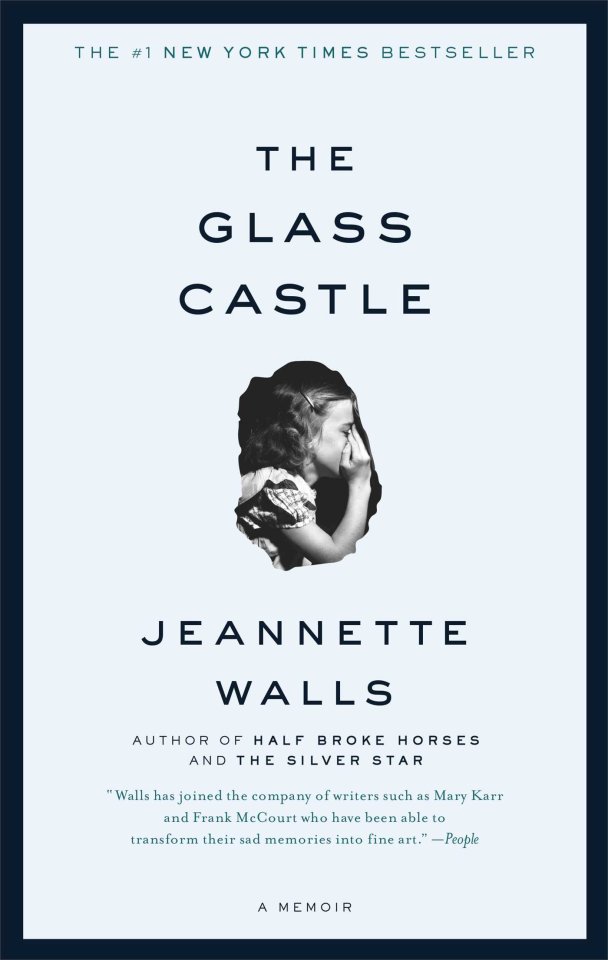
the glass castle by jeannette walls:
another one i’ve heard a lot about. i think the first place i heard about this memoir was from a teacher in middle school who had just read it, and even then i was captivated by the premise. i never had a chance to pick it up until now when goodreads suggested it to me while i was doing some late-night book-shopping and i decided it was finally time.
jeannette walls writes about her family -- her parents’ inability to provide or nurture, and later their inexplicable refusal to accept help from their now-adult children.
honestly, this blurb alone really resonated with me. my dad moved around a LOT when he was a kid because his mom couldn’t hold down a job or make payments on the houses, and walls’s early childhood seems really similar. also, a major point in the blurb is the close-knitness of jeannette and her siblings. i have three sisters and after a #unfortunateseriesofevents (the hashtag is not silent) in our childhoods we’re all super close and would do absolutely anything for each other.
all in all, i’m super excited to read this memoir. it seems fascinating, and i’ve heard the writing is incredible. i am expecting to cry during this one. (UPDATE: read it. loved it. will post a review later.)
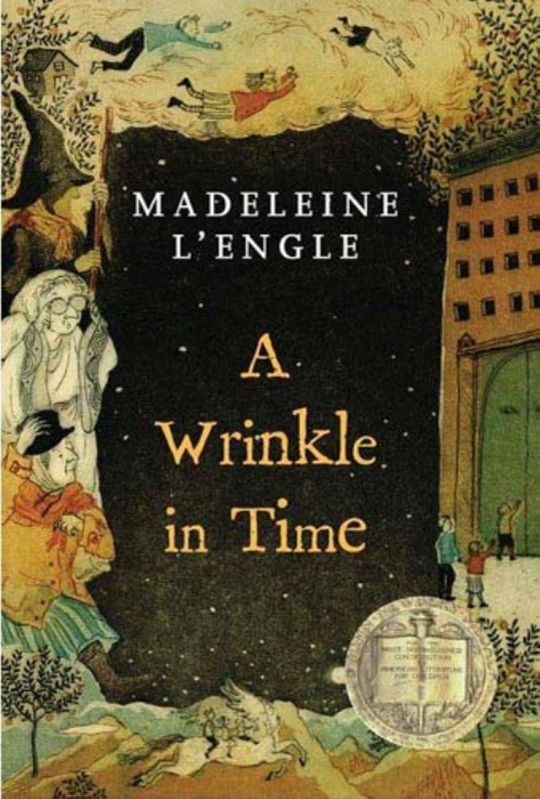
a wrinkle in time quintet by madeleine l’engle:
oh, madeleine l’engle. i read i think the first three books when i was a kid and never managed to make it to the last two. i reread the first one mayyybe a year ago? but never tried to go on to the other ones. i absolutely loved meg and identified really heavily with her, and this was one of those books that really defined my personality as a kid.
now, i’ve had some good and some bad experiences rereading books i loved as a kid, especially series. the phantom tollbooth held up, while the chronicles of narnia did not. turns out the whole thing is just the bible but with lion jesus. but i think this one’ll go over well. if i do read it soon, it’ll probably be all in a row during this break. it’s the kind of thing you’ve got to read all at once.
gifts:
every year i ask for books. every year my mom’s like “no, are you sure? don’t you want something other than books?” every year i’m like, no. just books. this year i went a step forward and provided her with my list of books i’ve been meaning to pick up. she delivered. thanks mom. just a note: the way i put books on that list is i see them (often on booktube !) and think to myself, huh, that looks neato. it’s not a hard list to get onto, so sometimes i don’t actually know anything about the book. it’s a fun guessing game.

wicked like a wildfire by lana popović:
first: love her name. like, as a whole. it’s a lovely name. second: love the cover. it’s a lovely cover. that’s probably how it got onto the list.
iris and malina live with their mother in a small village in montenegro. just like the rest of the women in their family, they have what they call gleams: iris perceives fractals in flowers and renders the designs in glass. malina hears the moods of people around her as though they were music. their mother jasmina has forbidden them to reveal their gleams. iris and malina of course decide that life is not for them. and then their mother is attacked and the girls unleash a curse on themselves. it happens.
reading the blurb, it definitely appeals to me. i’m really really hoping it focuses on iris and malina’s relationships with each other and their family, because no love interest is really mentioned in the blurb? and like, i know that there’ll probably be some kind of romantic subplot. but i’m hoping it’s minor, because everything else sounds far more interesting. also curious where the title comes from? the second book also has a fiery name, so. fire probably plays some kind of role in the series. probably.

a darker shade of magic by v.e. schwab:
my best friend loves ve schwab. for almost a year she’s been recommending her books to me. i finally caved. well. i already had it on the list, my mom buying it for me just propelled it up my tbr.
kell travels between londons. grey london (mundane, ruled by a crazy king), red london (where magic is life and life is magic), and white london (slowly being destroyed by a magical war). he also smuggles things to and from these londons. where he doesn’t go, where no one goes, is black london. so when he ends up with an artifact from black london, it’s not exactly a great find. running into delilah bard, who robs him, then saves him, then makes him smuggle her between londons, doesn’t exactly improve the situation.
this sounds great actually ! i trust my friend’s taste, it just usually takes me forever to get to her recs. by this point i should really know that she’s got my number when it comes to fantasy books. smuggling? yes. what sounds like a very well-developed political and sociological system? yes. i’ll probably get to this one sooner rather than later.
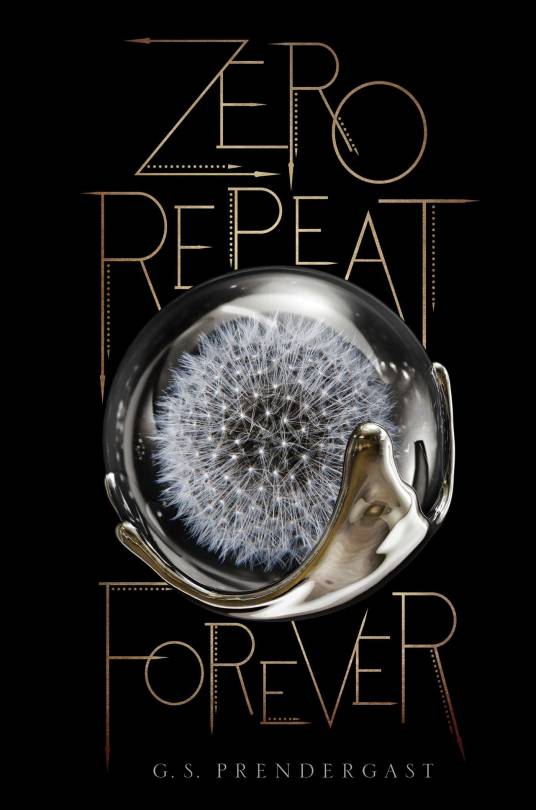
zero repeat forever by g.s. prendergast:
uhh to be honest i did not remember putting this one on my list. neither the cover nor the blurb ring a bell. probably made it on there during a late night booktube viewing when i was avoiding studying for finals.
raven and her fellow campers can’t do anything. they’re trapped at a summer camp of all places when the nahx invade. raven is not exactly satisfied, but more forced, to remain helpless and without recourse. until her boyfriend is killed. on the opposite side, eighth has only one mission: to protect his partner. and then she’s killed. eighth and raven are on opposing sides of a battle that neither wants to be in. so why are they so strongly attracted to each other?
gonna be honest here folks. this book sounds very heterosexual. like, aggressively straight. like, i would not have picked it up at a bookstore after reading the inside cover. maybe it’s the men with numbers for names, but the tone almost reads like divergent to me? i’m not sure. just the vibe it gives off. i’m holding out hope that even if it is mostly focused on the romance, it’s well-developed, and the setting and plot are worth it.
#bookblr#book#book haul#reading#ve schwab#a darker shade of magic#all the light we cannot see#anthony doerr#zero repeat forever#gs prendergast#a wrinkle in time#madeleine l'engle#wicked like a wildfire#lana popovic#the glass castle#jeannette walls
0 notes
Photo
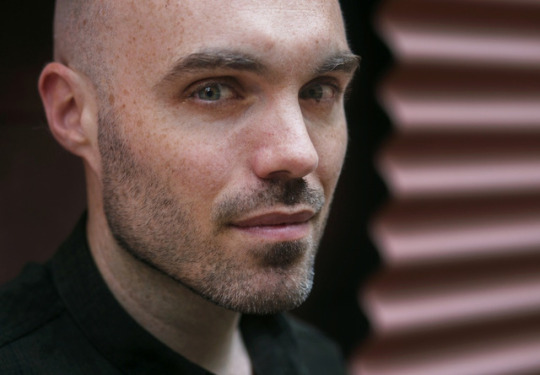
The Unexplainable Energy of David Lowery
DAVID LOWERY IN NEW YORK, JUNE 2017. PORTRAIT: TESS MAYER. Filmmaker David Lowery has an intriguing conception of what a ghost is: In his words, it’s “a spirit that refuses to move on.” His understanding of the term—more figurative than it is literal—may be a key part of why his odd new movie, A Ghost Story, works so well. Considering that he himself was the inspiration for the namesake phantom in the film, it’s funny, too. Lowery’s breakthrough film, Ain’t Them Bodies Saints (2013), paired Casey Affleck and Rooney Mara as Bonnie and Clyde-style Texan outlaws. The 36-year-old’s new movie, which he also wrote and edited, reunites Affleck and Mara as a young couple whose shared life we glimpse only briefly. Affleck’s character dies in a car accident, and A Ghost Story chronicles his existence after he becomes a ghost. Mara gives a soulful and volatile performance as his widow and Affleck deftly manages the tricky task of embodying a haunted spirit. Unable to communicate with Mara’s character, Affleck’s ghost can only observe her grief and watch her slowly move on, spurring him to journey through memory and history and to meditate on time, meaning, and existence. We recently met with the dynamic filmmaker—who also adapted the Disney movie Pete’s Dragon (2016), and who recently wrapped production on a movie starring Robert Redford that was adapted from a New Yorker story—at an office in New York. A Ghost Story, which premiered at the Sundance Film Festival earlier this year, is decidedly different in spirit and form from the more commercial Ain’t Them Bodies Saints, and Lowery, who made his name as a film editor before developing the script for Saints at the Sundance Screenwriters Lab, sounds curious and a little wistful about the possibility of watching the two movies for the first time, back-to-back. Then he tells us about the genesis of his unconventional new film. DAVID LOWERY: In terms of the script, the movie spontaneously combusted in one sitting. It was a bunch of ideas that had been circling my subconscious or conscious mind for years in some cases, but I’d never done anything with them until I sat down to write this. One of those ideas was a haunted house movie starring a ghost with a sheet. I’d always loved that idea, and I wanted to use it. I’d seen it elsewhere and wanted to do my own spin on it. Then, on a personal level, the root of it came from a move I made from Texas to L.A., and the house I’d left behind, which I’d grown incredibly attached to, even though it was just a shabby old farmhouse that we were renting. It was the first house my wife and I lived in after we got married. I’d, for better or worse, laid down many roots there, emotional and otherwise—I actually planted a garden for the first time in my life—and I didn’t want to leave it when we had to leave. I was really upset and kind of heartbroken to move out of it, and I wasn’t sure why because, on a pragmatic level, it made no sense to stay there. I had suggested that we just kept paying rent there, so we had it as a place to go back to, and that made zero sense whatsoever. So that was a lingering thing throughout the latter half of 2015 as we laid down new roots in Los Angeles. That Christmas, I went home to visit my family for the holidays, and my wife and I got into a huge argument while we were there because I suggested we move back to Texas when our Disney movie [Pete’s Dragon] was done. She had a very vehement reaction to that. She was done with Texas. It was one of those arguments where, in the moment, I felt like I could see a potential end to our relationship, and the idea that our relationship could come to an end over something as trivial as where we were living, was very strange to me. Also, I recognized that I was the problem in that situation—because I was the one holding onto something and not wanting to let go. That tendency that I have—that unwillingness to let go, that obsession with sentimentality and nostalgia and attachment to physical things in my past were all to blame for that problem we were having. That was where a lot of this movie came from. JULIA YEPES: It’s interesting that you mention your attachment to physical things from your past and your sentimentality toward them, because you have letter-writing in both Ain’t Them Bodies Saints and this movie. Is there something that’s poignant to you about the act of letter-writing or even that of people simply trying to document their feelings? LOWERY: Completely. My wife and I, we knew each other back in 2001 but had fallen out of touch. One day I had a dream about her and wrote her a note on Facebook—I was living in L.A. at the time—and that turned into six months of just letter-writing. It started off with Facebook messages and turned into emails and eventually became actual hand-written letters. We got to know each other very well through that, and when we finally met up in person, we were basically already in a relationship, and six months later we were engaged. I attribute a great deal of it to the tactile and patient qualities that letter-writing demands, and the degree to which it’s a personal act. It’s almost one of the ultimate personal expressions because you’re doing it by hand. I take a great deal of value in things that are done by hand, or executed by hand. The act itself is something that fascinates me, almost more than what the contents might say, which is why you don’t see what’s on the note in Ain’t Them Bodies Saints. There was the scene where she’s writing the letter, and it wasn’t until the final stages of post-production, I finally gave in and said, “Okay, let’s hear what she’s writing.” Up until that point, I was always going to just leave it a secret, not because I wanted to keep it a secret, but just because I felt it was unnecessary to show it. YEPES: Harvey Weinstein gave you notes for that movie. Was that something he suggested? LOWERY: No. We’d done some test screenings and people were like, “What does it say?” It was a long dolly shot pushing in on her writing. And people were like, “What does it say? We should know what it says.” And I was like, “You know what, you’re right. Let’s hear what it says.” So I wrote a letter and people loved hearing it, and it was a very emotional moment for the movie and probably was the right thing to do. YEPES: It’s a release for the audience. LOWERY: Yeah, exactly. It was probably a week before we showed it at Sundance that I added that in. Rooney went to a studio and we just recorded it over the phone and dropped it in, so it was literally last minute. YEPES: The argument that you had with your wife is interesting because the movie is pretty spare with the dialogue between Casey’s character and Rooney’s character, and it feels consequential when she says, “What is it you like about this place?” And he says, “History.” And when she says, “We’re supposed to be making decisions together.” Both of those exchanges felt really real and I think the audience connects with those snippets of conversation immediately. LOWERY: Those were literally things my wife and I said to each other. Casey and Rooney, in those scenes, are playing us, and my wife was there when we were shooting them, and I remember her rolling her eyes. She thought it was really cool, but at the same time very strange, and knowing me, she felt it was probably just a little too on the nose and obvious for me to literally put our entire discussion into a movie. YEPES: It’s also funny when you see Casey Affleck who looks a little bit like you… LOWERY: Yeah. We have vaguely similar cheekbones. Every now and then, it’s just so obvious— YEPES: It’s comical, some of the images of the two of you standing side-by-side. LOWERY: Yeah. If only he shaved his head. YEPES: I want to hear about how you worked with ghost iconography and ghost mythology in this movie. I read on your blog how you really liked the title of this children’s book, Gus Was A Friendly Ghost (1962)—you liked that the title referred to the ghost in the past tense. LOWERY: I’ve always loved ghosts, ever since reading those books. That might have been my first introduction to ghosts as a child because my parents had those books on our bookshelf. It was one of my earliest memories, them reading them to us. And they were never a scary thing to me—until I got a little older and understood the potential for them to be scary—and I never dressed up as a ghost for Halloween because it was too simple and I always took Halloween way too seriously, but my brother did, so that image is something that is deeply rooted in my childhood. I liked the idea now of taking what is basically the universal symbol for a spirit who refuses to move on from this realm of existence and unpacking it. Because it is a common symbol—it’s Snapchat. Snapchat’s logo is a sheet ghost. YEPES: Oh yeah, that’s funny. LOWERY: And if you write the word ‘ghost’ on your iPhone, the emoji pops up of a little ghost with a sheet. It’s an image that is very commonplace, and one which we take for granted, and one which has a lot of potential to be charming and goofy and childlike, but which also packs a great deal of meaning into its very simple form. I wanted to tap into that a little bit. My fascination with tactile objects and handmade materials comes into play as well because I love the idea of taking something that is very ethereal and meant to be phantasmagoric but rendering it with the most handmade approach possible. I also have to admit that I liked the challenge of trying to take what is an inherently silly concept and imbuing it with some degree of gravitas. YEPES: Right. The line between the supernatural and the mundane is blurred in the movie in an interesting way. There was a scene where it seems like somethingsupernatural is happening inside the house, and it’s actually a bulldozer coming through the roof. LOWERY: Exactly. YEPES: But you think it’s something spiritual— LOWERY: You think it’s the Rapture. Later in the movie, there’s a giant bang on the door, but it’s just Rooney scaring Casey. YEPES: Yes, you play with stock moments that we’re familiar with from scary movies. LOWERY: Exactly. I love horror films. I love ghost movies and haunted house movies. I wanted to be able to use those tropes, not to turn them on their head, but to use them in a different way than one would anticipate, so it’s a haunted house movie that’s not scary, except at times when it is—but it’s not the ghost that makes it scary. YEPES: How did you figure out that you needed the scene where Rooney eats the better part of a whole pie as a way to show grief? LOWERY: When I initially conceived of the idea of this movie, I wanted the whole thing to be a series of tableaux—one tableau for each scene that would represent the entirety of what that scene was about, and for that one I knew that it was about her grieving for a lost loved one. I wanted it to be very physical because I find that grief is very physical. You feel it in your stomach and you feel it through your whole body and you can show someone burying their head in a pillow and crying, which we do one scene later, but that doesn’t convey the depths to which grief reaches. So I wanted there to be a physicality to it, and I wanted it to be a very private moment that was almost uncomfortable to watch, and so eating seemed like the natural thing. I’d read Joan Didion’s book The Year of Magical Thinking (2005)—I shared it with Rooney too—because I thought it was a really good window as to what goes through someone’s mind when they’ve lost a partner, and she describes the ways in which grief manifests itself the most profoundly in the most mundane activities, and the most unexpected, everyday, quotidian activities are the source of some of the deepest sorrow she felt after her husband passed away. Eating is about as mundane as it gets, and I felt that that was something that would be powerful and uncomfortable and also incredibly relatable, and it was also something that I knew would be memorable because I knew that Rooney doesn’t have a lot of dialogue in the movie. After that scene, I think she has one line in the whole film, aside from some of the flashbacks, and it needed to convey quite a bit. I felt that that was an appropriate vehicle to do that. YEPES: Right. And it’s very expressive in a way that actually registers, whereas if she was just hysterically crying, we’ve seen that so many times that— LOWERY: You sort of check out. YEPES: Yeah. Why did you choose to have the Spanish speaking family inhabit the house and not to have subtitles for those scenes? LOWERY: I love the Spanish language. I don’t speak it very well—I don’t speak it at all, really, but I can get by if I go somewhere and I need to—but as a language, I just think it’s absolutely beautiful, and I found while we were shooting that scene, that I could understand like every fifth word. I’d written all the dialogue in English and had it translated into Spanish, so I knew what was going on, but it was easier for me to just tap into the emotion of the scene and direct it on an emotional level rather than to articulate what I wanted for a certain line of dialogue. I just loved that experience. It was a really profound experience for me. It made me realize that even though all the dialogue was written with a great degree of originality and what she’s saying in every scene matters, to some extent, it’s more of an emotional sequence than it is a literal sequence. So removing subtitles allowed audiences to participate with it on a purely emotional level, similar to how I was participating with it as a director. At that point in the movie, I wanted to have a classic ghost story sequence that was similar to Poltergeist (1982) or The Haunting (1963), and to work with a lot of traditional haunted house material. If I really wanted to go all the way with Poltergeist, I could have had another suburban family move in and really riff on that, but I thought it would be really cool for it to be more reflective of society, especially in Texas where it’s so multi-cultural, and every other person does speak Spanish, and that gave me the opportunity to have part of the movie in another language that I love listening to. YEPES: I love that the kids can see the ghost. LOWERY: Yeah. It’s just like classic Spielberg. We’d do those shots of them gazing at the ghost and be like, “That’s us ripping off Close Encounters of the Third Kind (1977).” I love also that the ghost throws his temper tantrum and tries to scare them out, and they don’t leave. She picks up the plates and looks at the ghost with the same kind of maternal gaze that she looks at her kids—even though she can’t really see him, there’s that moment where they appear to be looking at each other that was just really beautiful to me as well. It put Casey’s character in his place after throwing that ridiculous temper tantrum. YEPES: I know that you are an atheist and you say you don’t believe in the afterlife. Have you ever seen a ghost? Also, you have the scene where the ghost seems to commit suicide, but then you’re like, “Is it a dream?” Can the ghost die, or maybe he can’t because he’s haunted? LOWERY: The idea there is he’s trying to find a way out, but it’s not time for him to move on yet, so he just winds up unstuck in time, and having to relive certain events to get back to where he needs to be. But I do believe in ghosts, even though I don’t believe in an afterlife, and there’s an inherent paradox there, which I can only explain as the result of my faith in the mysteries of the universe. I think that there are things we can’t explain, there’s energy around us that we haven’t been able to quantify, and within those mysteries lies my ability to believe in ghosts. I’ve never seen anything, but I’ve had circumstances occur that are strange—noises, lights turning on, rooms that feel like they’re the wrong temperature. I’ve had phenomena that I could technically explain logically, but I allow myself not to, because I’d rather believe that maybe there’s something supernatural afoot. YEPES: With A Ghost Story, did the actors come up with any good ideas that helped shape the movie? Did they have the instincts to do that, or was it too hard to do because the movie is so experimental? LOWERY: There was a little bit of that because we shot a lot more with Casey and Rooney prior to his character’s death than is in the film. We spent two days—which really isn’t that much time—just filming them in domestic situations and digging into their characters. I’d written 10 pages of material that we filmed almost like a stage play, and we spent a day doing that, and there’s a little bit of that in the movie. I wrote ideas for a bunch of other scenes, and the next day, we just jumped in and out of the house, and some of it was recapitulations of dialogue they had done the previous day, but just in a new context. Other things were brand new pieces of information or brand new ideas or just moments for them to share together. Within that exploration, they were able to come up with a lot of material on their own. The scene that opens the movie, where Casey and Rooney are lying on the couch together, that was an idea he had, and we didn’t know what he was going to do. He said, “Hey, I want to shoot a scene where the two of us are on the couch together and we just finished watching a movie, and I’ll take it from there.” And so the first line of the movie is Rooney saying, “I’m scared,” and she’s laughing, and the reason she’s saying that is we’re about to start shooting and she doesn’t know what’s going to happen. That was 100 percent just her anticipating whatever curveball Casey was about to throw at her. Ultimately, we used a lot of that. Yet if I hadn’t let Casey have enough creative input to propose a scene, we wouldn’t have had that opening scene and I don’t think the opening of the movie would have been as strong, so I did let them bring a lot to it, but obviously the movie was much more rigid and much more formal than Saints, and much less narrative. And of course without dialogue, it often comes down to body language and that is a much more rigorous thing. YEPES: Right. And then there are these stationary shots in this movie. LOWERY: But even in that, when Rooney comes home from the funeral and is eating pie, she had the idea to sit down on the floor. That was all her. We had planned the scene differently and intended to shoot the scene differently. But when she suggested that, that redefined the scene in terms of how we were going to block it out and how we were going to execute it, and it made it a million times better. And that was all her. So even in those very restrained and minimalist scenes, I did count on and court their input, and I value that. But I am also learning to value my original instincts more and to give myself a little bit of credit for the amount of time I spend writing dialogue, so I’m not changing gears so much. There are times I’m less willing than I used to be to just throw everything out the window for any random reason—because sometimes I’ve realized it’s more important for me to convince an actor why I wrote a thing a certain way than to just let them change it. YEPES: You also kind of suggest in the film that there are ghosts all around us. LOWERY: I don’t know if it’s ghosts or what it is, but I do believe in the burnt toast theory, as elucidated in The Shining (1980), which is that when you leave a room, you leave a little bit of yourself behind, and I don’t know what that is, I don’t know if it’s quantifiable or not, but I do subscribe to that idea. Out of that subscription, I am able to believe in… well, let’s call them ghosts. But whether they’re presences, whether it’s just leftover energy, whether it’s an actual spirit that is stuck in the space, I think they are all around us, whatever “they” may be. Beyond that, I have no idea. Beyond that, I don’t pretend to have any clue how these things work or what the rules might be or whether it’s actually real or not, but I like to believe it is. A GHOST STORY OPENS TOMORROW, JULY 7.
—Julia Yepes Editor: Emma Brown
July 6, 2017
0 notes
Text
[Jonathan H. Adler] Nancy MacLean responds to her critics
Neither Nancy MacLean, author of the controversial “Democracy in Chains,” nor her publisher has responded to my invitation to post a response to criticism of her book. MacLean has, however, responded to her critics in an email interview with the Chronicle of Higher Education, which also covers the controversy in an accompanying story.
The interview is worth reading. Here are a few highlights.
First, the interview discusses the attacks on her book. MacLean confirms that she authored a Facebook message alleging the existence of a “coordinated” campaign against her book. The Chronicle then asked her about that allegation.
Do you have any evidence for your claim in that Facebook message that the attacks on your work are “coordinated”?
I’m not saying they called each other up and planned a series of critical responses to my book. What I’m saying is many of the critics come from similar backgrounds — they are libertarians who trained at or are employed by the very institutions I write about in my book.
And some of the rhetoric has been quite threatening. Jonah Goldberg, senior editor of National Review, said I should worry about the “the libertarian super-posse on my ass.”
So, according to MacLean, the only evidence of “coordination” behind the criticism of her book is, well, that many of us are libertarians who attended or teach at George Mason, and whom Jonah Goldberg referred to as a “super-posse.”
As for some of the substantive critiques of her book that have come from liberals, this is what MacLean has to say.
The left-wing historian Rick Perlstein wrote in a Facebook post, “The foundation of the entire book [Democracy in Chains] is a conspiracy theory that suggests that if you understand THIS ONE SECRET PLAN, you understand the rise of the right in America in its entirety. Which suggests you don’t need to understand any of a score of other important tributaries. … That you don’t need to read anything else. Which is actively dangerous to historical understanding.” Perlstein was commenting on an article by Farrell and the political scientist Steven Teles. Its basic thrust was that your book caricatures its right-wing subjects in a way that does a disservice to political discussion and even misleads those on the left and center searching for a way forward. What’s your response to Perlstein, Farrell, and Teles?
As a scholar, I would never say “you don’t need to read anything else.” Of course there were other tributaries feeding the right; we have a huge body of scholarship now that explores them, much of which I cite in the 60 pages of endnotes that document the text. But my work draws attention to a missing piece of the puzzle that had been ignored, one that puts the current alarming state of our politics in an illuminating new light.
As for Farrell and Teles, I have to assume, based on what they wrote, that they did not give my book a close reading. My book is not a history of public choice (which I explained was broader than the Virginia variant on which I focused). The book traces the history of an idea — the idea of enchaining modern democratic government, as developed by James Buchanan. It shows how that idea came to appeal to an extremely wealthy and messianic individual, Charles Koch, who has harnessed it and organized other extremely wealthy donors to fund efforts, staffed by thousands of people, to radically alter our government in ways that will be devastating to millions of people and already seem to be producing an utterly unsustainable society in terms of social norms and governance.
So those who disagree with her, or who critique her work, simply didn’t read the book closely enough. Here, for the record, is an excerpt from the Farrell and Teles critique:
While some on the left have hailed the book, libertarians and conservatives have attacked it online. Several have argued that MacLean misleadingly truncates quotes, to make it seem as if Buchanan and other libertarians such as Tyler Cowen are anti-democratic. While they obviously have a great deal of skin in the game, their critiques of the book have landed a number of solid blows.
For instance, when MacLean claims that Cowen is providing “a handbook for how to conduct a fifth column assault on democracy,” she cites as evidence Cowen’s statement that “the weakening of checks and balances would increase the chance of a very good outcome.” Unfortunately, she declines to provide the reader with the second half of the sentence, which goes on to note that “it would also increase the chance of a very bad outcome.” Nor, as she has claimed in interview, is the title of Cowen’s blog Marginal Revolution a signal to the illuminated that Cowen is undertaking a gradual revolution by stealth (it’s actually a well-known term for the birth of modern economics).
She accuses David Boaz, executive vice president of the Cato Institute, a libertarian think tank, of believing that “close to half of American society is intent on exploiting the rich” when he writes about a “parasite economy” of predators and prey. In fact, the predators Boaz is talking about are specific interests lobbying for subsidies, tariffs, quotas, or trade restrictions. While his claims can be contested, they are simply not what MacLean says they are.
Elsewhere in the interview, MacLean says that she and Farrell “have a different understanding of what would constitute adequate evidence” to support a claim” (in this case, the claim that a paper James Buchanan published in the Cato Journal was an important strategy document). As for close reading of sources and use of evidence to substantiate claims, this review by J. Morgan Kousser of MacLean’s 1994 book on the Ku Klux Klan appears somewhat prescient.
On the question of whether Buchanan’s work bears any relation to that of John Calhoun, MacLean writes:
The anger over my linking Buchanan with Calhoun at least brought me a moment of levity. George Mason’s Donald Boudreaux called it “astonishing” that I drew a parallel between Buchanan’s political economy and that of John C. Calhoun. Yet it was not I but Boudreaux’s own colleagues at George Mason’s Mercatus Center, Alexander Tabarrok and Tyler Cowen, who called the antebellum South Carolina senator’s thought “a precursor of modern public choice theory” and concluded that the two systems of thought had “the same purpose and effect.
MacLean says Boudreaux found it “astonishing” that she “drew a parallel” between Buchanan and Calhoun. Here, however, is what Boudreaux actually wrote:
Even more astonishing is MacLean’s assertion that Buchanan-style libertarians’ “fundamental core concepts” come from John C. Calhoun. Her only evidence for this claim – namely, that Calhoun was mentioned as an influence by the libertarian Murray Rothbard – isn’t evidence at all. Buchanan was no great admirer of Rothbard, and the number of times that Calhoun is cited in any of Buchanan’s published works is zero. As in “never.” Not once.* (I knew Buchanan for the last 28 years of his life and I do not recall ever hearing Jim mention Calhoun.) [Emphasis added.]
So what Boudreaux found “astonishing” was not that someone might find parallels between Buchanan’s work and that of Calhoun, but instead MacLean’s claim that Calhoun was the source of Buchanan’s ideas. Among MacLean’s claims in the book is that Calhoun was the “intellectual lodestar” for Buchanan and like-minded intellectuals. For more on MacLean’s efforts to link Buchanan and Calhoun, I recommend this post by Phil Magness.
On her critics, MacLean also adds:
Most disturbing, though, is how many of the book’s critics fail to disclose their financial indebtedness to the cause whose history my book explores. The book is critical of the network of think tanks and foundations that operate with aid from the Koch brothers. Many of the critics have benefited from grants from the Koch Foundation or related groups. Yet very few have acknowledged that financial relationship. And that’s troubling because full disclosure of such income is Ethics 101, as it calls into question the recipient’s ability to remain unbiased.
Since MacLean apparently believes some of us have not been sufficiently candid with potential conflicts of interest, I should probably remind readers that I attended law school at George Mason University, which has also received money from the Kochs, much of it long after I graduated. As I am a Virginia resident, my tuition was subsidized by state taxpayers (thanks, guys!) and a non-Koch-related scholarship. I paid the rest as I went at night while working full time. I spent a semester as a visiting professor at GMU some years later and was offered a tenured position on the faculty. I declined the offer because my bride-to-be and I decided we’d rather raise a family in Ohio than inside-the-Beltway.
Over the years I have spoken at various Koch-sponsored programs, for which I received modest honoraria. I have also spoken at programs sponsored by organizations receiving money from George Soros, the late Peter Lewis and various progressive donors. In the past, I have solicited and received grants for projects from the Charles Koch Foundation, the last of which was this roundtable eight years ago, for which I received no compensation (which probably reflects how bad I am at working the whole gravy-train thing). Ditto various progressive donors.
As longtime VC readers can attest, none of this prevented me from being quite critical of the Kochs when I thought they deserved it (as in my extensive series of posts on the Koch-Cato dispute, many of which may be found here) or from taking positions at odds with many Koch-funded organizations (such as my support for a carbon tax and other policies to mitigate the threat posed by climate change). I don’t know whether such work will affect my chances of obtaining another Koch grant should I seek one in the future, but I frankly don’t care. That’s not why I write what I write. It also has absolutely nothing to do with whether MacLean adequately substantiates her claims or fairly represents her sources.
The interview concludes with MacLean explaining that her hope is to expose the libertarian plan to “radically change the rules of governance in order to change society” so as to give capitalism “free rein” and protect “the rights of the wealthy few.” Writes MacLean: “It’s critical to bring this vision out into the open, so we can have honest debate about the kind of country we want.” I agree with MacLean that it’s important to have an “honest debate” on Buchanan’s ideas, as well as other ideas that inform public debates over the future of our great nation. Readers can decide for themselves whether “Democracy in Chains” contributes to that endeavor.
For more on the controversy over “Democracy in Chains,” see this post, which I have updated regularly.
0 notes
Text
Nancy MacLean responds to her critics
Neither Nancy MacLean, author of the controversial “Democracy in Chains,” nor her publisher has responded to my invitation to post a response to criticism of her book. MacLean has, however, responded to her critics in an email interview with the Chronicle of Higher Education, which also covers the controversy in an accompanying story.
The interview is worth reading. Here are a few highlights.
First, the interview discusses the attacks on her book. MacLean confirms that she authored a Facebook message alleging the existence of a “coordinated” campaign against her book. The Chronicle then asked her about that allegation.
Do you have any evidence for your claim in that Facebook message that the attacks on your work are “coordinated”?
I’m not saying they called each other up and planned a series of critical responses to my book. What I’m saying is many of the critics come from similar backgrounds — they are libertarians who trained at or are employed by the very institutions I write about in my book.
And some of the rhetoric has been quite threatening. Jonah Goldberg, senior editor of National Review, said I should worry about the “the libertarian super-posse on my ass.”
So, according to MacLean, the only evidence of “coordination” behind the criticism of her book is, well, that many of us are libertarians who attended or teach at George Mason, and whom Jonah Goldberg referred to as a “super-posse.”
As for some of the substantive critiques of her book that have come from liberals, this is what MacLean has to say.
The left-wing historian Rick Perlstein wrote in a Facebook post, “The foundation of the entire book [Democracy in Chains] is a conspiracy theory that suggests that if you understand THIS ONE SECRET PLAN, you understand the rise of the right in America in its entirety. Which suggests you don’t need to understand any of a score of other important tributaries. … That you don’t need to read anything else. Which is actively dangerous to historical understanding.” Perlstein was commenting on an article by Farrell and the political scientist Steven Teles. Its basic thrust was that your book caricatures its right-wing subjects in a way that does a disservice to political discussion and even misleads those on the left and center searching for a way forward. What’s your response to Perlstein, Farrell, and Teles?
As a scholar, I would never say “you don’t need to read anything else.” Of course there were other tributaries feeding the right; we have a huge body of scholarship now that explores them, much of which I cite in the 60 pages of endnotes that document the text. But my work draws attention to a missing piece of the puzzle that had been ignored, one that puts the current alarming state of our politics in an illuminating new light.
As for Farrell and Teles, I have to assume, based on what they wrote, that they did not give my book a close reading. My book is not a history of public choice (which I explained was broader than the Virginia variant on which I focused). The book traces the history of an idea — the idea of enchaining modern democratic government, as developed by James Buchanan. It shows how that idea came to appeal to an extremely wealthy and messianic individual, Charles Koch, who has harnessed it and organized other extremely wealthy donors to fund efforts, staffed by thousands of people, to radically alter our government in ways that will be devastating to millions of people and already seem to be producing an utterly unsustainable society in terms of social norms and governance.
So those who disagree with her, or who critique her work, simply didn’t read the book closely enough. Here, for the record, is an excerpt from the Farrell and Teles critique:
While some on the left have hailed the book, libertarians and conservatives have attacked it online. Several have argued that MacLean misleadingly truncates quotes, to make it seem as if Buchanan and other libertarians such as Tyler Cowen are anti-democratic. While they obviously have a great deal of skin in the game, their critiques of the book have landed a number of solid blows.
For instance, when MacLean claims that Cowen is providing “a handbook for how to conduct a fifth column assault on democracy,” she cites as evidence Cowen’s statement that “the weakening of checks and balances would increase the chance of a very good outcome.” Unfortunately, she declines to provide the reader with the second half of the sentence, which goes on to note that “it would also increase the chance of a very bad outcome.” Nor, as she has claimed in interview, is the title of Cowen’s blog Marginal Revolution a signal to the illuminated that Cowen is undertaking a gradual revolution by stealth (it’s actually a well-known term for the birth of modern economics).
She accuses David Boaz, executive vice president of the Cato Institute, a libertarian think tank, of believing that “close to half of American society is intent on exploiting the rich” when he writes about a “parasite economy” of predators and prey. In fact, the predators Boaz is talking about are specific interests lobbying for subsidies, tariffs, quotas, or trade restrictions. While his claims can be contested, they are simply not what MacLean says they are.
Elsewhere in the interview, MacLean says that she and Farrell “have a different understanding of what would constitute adequate evidence” to support a claim” (in this case, the claim that a paper James Buchanan published in the Cato Journal was an important strategy document). As for close reading of sources and use of evidence to substantiate claims, this review by J. Morgan Kousser of MacLean’s 1994 book on the Ku Klux Klan appears somewhat prescient.
On the question of whether Buchanan’s work bears any relation to that of John Calhoun, MacLean writes:
The anger over my linking Buchanan with Calhoun at least brought me a moment of levity. George Mason’s Donald Boudreaux called it “astonishing” that I drew a parallel between Buchanan’s political economy and that of John C. Calhoun. Yet it was not I but Boudreaux’s own colleagues at George Mason’s Mercatus Center, Alexander Tabarrok and Tyler Cowen, who called the antebellum South Carolina senator’s thought “a precursor of modern public choice theory” and concluded that the two systems of thought had “the same purpose and effect.
MacLean says Boudreaux found it “astonishing” that she “drew a parallel” between Buchanan and Calhoun. Here, however, is what Boudreaux actually wrote:
Even more astonishing is MacLean’s assertion that Buchanan-style libertarians’ “fundamental core concepts” come from John C. Calhoun. Her only evidence for this claim – namely, that Calhoun was mentioned as an influence by the libertarian Murray Rothbard – isn’t evidence at all. Buchanan was no great admirer of Rothbard, and the number of times that Calhoun is cited in any of Buchanan’s published works is zero. As in “never.” Not once.* (I knew Buchanan for the last 28 years of his life and I do not recall ever hearing Jim mention Calhoun.) [Emphasis added.]
So what Boudreaux found “astonishing” was not that someone might find parallels between Buchanan’s work and that of Calhoun, but instead MacLean’s claim that Calhoun was the source of Buchanan’s ideas. Among MacLean’s claims in the book is that Calhoun was the “intellectual lodestar” for Buchanan and like-minded intellectuals. For more on MacLean’s efforts to link Buchanan and Calhoun, I recommend this post by Phil Magness.
On her critics, MacLean also adds:
Most disturbing, though, is how many of the book’s critics fail to disclose their financial indebtedness to the cause whose history my book explores. The book is critical of the network of think tanks and foundations that operate with aid from the Koch brothers. Many of the critics have benefited from grants from the Koch Foundation or related groups. Yet very few have acknowledged that financial relationship. And that’s troubling because full disclosure of such income is Ethics 101, as it calls into question the recipient’s ability to remain unbiased.
Since MacLean apparently believes some of us have not been sufficiently candid with potential conflicts of interest, I should probably remind readers that I attended law school at George Mason University, which has also received money from the Kochs, much of it long after I graduated. As I am a Virginia resident, my tuition was subsidized by state taxpayers (thanks, guys!) and a non-Koch-related scholarship. I paid the rest as I went at night while working full time. I spent a semester as a visiting professor at GMU some years later and was offered a tenured position on the faculty. I declined the offer because my bride-to-be and I decided we’d rather raise a family in Ohio than inside-the-Beltway.
Over the years I have spoken at various Koch-sponsored programs, for which I received modest honoraria. I have also spoken at programs sponsored by organizations receiving money from George Soros, the late Peter Lewis and various progressive donors. In the past, I have solicited and received grants for projects from the Charles Koch Foundation, the last of which was this roundtable eight years ago, for which I received no compensation (which probably reflects how bad I am at working the whole gravy-train thing). Ditto various progressive donors.
As longtime VC readers can attest, none of this prevented me from being quite critical of the Kochs when I thought they deserved it (as in my extensive series of posts on the Koch-Cato dispute, many of which may be found here) or from taking positions at odds with many Koch-funded organizations (such as my support for a carbon tax and other policies to mitigate the threat posed by climate change). I don’t know whether such work will affect my chances of obtaining another Koch grant should I seek one in the future, but I frankly don’t care. That’s not why I write what I write. It also has absolutely nothing to do with whether MacLean adequately substantiates her claims or fairly represents her sources.
The interview concludes with MacLean explaining that her hope is to expose the libertarian plan to “radically change the rules of governance in order to change society” so as to give capitalism “free rein” and protect “the rights of the wealthy few.” Writes MacLean: “It’s critical to bring this vision out into the open, so we can have honest debate about the kind of country we want.” I agree with MacLean that it’s important to have an “honest debate” on Buchanan’s ideas, as well as other ideas that inform public debates over the future of our great nation. Readers can decide for themselves whether “Democracy in Chains” contributes to that endeavor.
For more on the controversy over “Democracy in Chains,” see this post, which I have updated regularly.
Originally Found On: http://www.washingtonpost.com/news/volokh-conspiracy/wp/2017/07/20/nancy-maclean-responds-to-her-critics/
0 notes
Text
Time Out Of Mind and the TV Guide

Bob Dylan released a record in 1997 called Time Out Of Mind, his first album of new material in seven years, the longest gap of his career in which he released no new songs. He released some old ones, mind you, on 1992′s Good As I Been To You and the following year’s World Gone Wrong, but both albums were lo-fi affairs, consisting only of old American standards and folk songs. Dylan’s version of “Froggie Went A Courtin” is the best thing on those two records, intimate and strange and haunted, with Dylan’s idiosyncratic picking style on full display. You can hear it here: https://www.youtube.com/watch?v=8c8kO5RQIQo
I used to be obsessed with Bob Dylan in high school, but was I more into his process and image than his music itself, which I found a little boring in an album context. Even back in 2001, long before the internet destroyed my attention span, I had a hard time sitting through entire Dylan albums. Blonde on Blonde, for example, one of his alleged masterpieces, consists of little more than blues dirges featuring a dutiful but dull backing band. Not much happening on that record for me, though I do like the deep cut “Achilles Last Stand,” and of course “Just Like A Woman” is one of the greatest songs ever written.
Dylan’s early stuff is just guy-with-guitar music, not the best thing for a young boy obsessed with the mix tape aesthetic. I made a shitload of mixtapes back in high school, most of them for my/our friend Emon, but some for myself, and I loved to put a blasting punk song right after a slow syrupy ballad. The jarring aspect of it, the audio equivalent of a smash cut, always gave me a thrill. I always preferred my Dylan songs sandwiched between Oasis and The Offspring, so a whole record of him strumming and warbling didn’t hold my interest. I feel the same way even now.
But I loved the idea of Dylan, the idea of a fiercely individualistic artist releasing albums at a furious pace, following the dictates of the muse, not the mass. I loved Dylan’s imagery of the American highway, augmented by my simultaneous obsession with Jack Kerouac’s On the Road, a book that has lit fire in the hearts of millions of young men who close the book and want to run out into the world and travel and drink and write bad poems while sitting on fence posts at dawn in Missouri, and I started writing songs about being a hitchhiker, songs about drinking coffee in diners at 6AM in small towns on the great plains, offbeat characters smoking in pool halls, sullen men sitting at the bar, gambling away their grocery money. To my embarrassment, one of these songs was actually called “Morning Cigarette.” I couldn’t just describe the lives of the lower classes, no, I had to align myself with them, insincerely I might add, and so I declared a smoking habit I had not yet acquired, claimed kilometres and miles I hadn’t yet earned, and described places I’d never been to and still may never go, sylvan beaches where blue water laps at the shore, where the highway finally ends and gives way to sand. All of this at the altar of the great American highway. REM’s Fables of the Reconstruction had some great highway and railroad imagery, especially “Driver 8″ and “Green Grow The Rushes.” I’ve mentioned REM’s “Leave” on here before, their greatest song, on an album recorded while the band was on tour and so has that rushing, disoriented, slightly seasick but gleeful feeling of constant highway travel, the thrum of the road beneath you as you rocket through the inky night. But REM came years after Dylan, so while I loved road imagery in literature inherited from the abovementioned Kerouac and Sam Shephard’s Motel Chronicles, Bob Dylan was the first musician I’d encountered who dealt in that kind of daylight.
I still love that highway stuff, though no longer to the exclusion of other modes of experience. The old excitement still comes back once in a while. Just a few years ago I came across a novel that captured the raw gritty reality of the road so vividly that I wanted to stick my thumb out again and see how far it would take me, a book called Angels by Denis Johnson, which features a ne’er do well drunk named Bill Houston who robs hardware stores and a desperate woman named Jamie Mays who is trying to escape her abusive husband by shuttling between states on Interstate Greyhounds, donating blood plasma to make her meals, carrying her silently suffering children along like sentient totebags. Eventually the woman and the bank robber cross paths (on a Greyhound, natch) and Bill takes Jamie down to Texas, splurging on booze and motels on the way like a sailor on shore leave, at one point trying to bribe a bus driver to take them to Philadelphia just so his Jamie and the kids can see the Liberty Bell. A drunken whim, needless to say. When the bus driver refuses, Bill Houston throws his bundle of cash to the floor and sets it aflame. Bill and Jamie and the kids are kicked off the bus for this stunt, and as they watch the bus pull way into the deep blue evening, the man mutters “this shit just keeps on happening til you’re dead.”
I think about that character a lot, Bill Houston. Here’s another great line: “It was all right to be who he was, but others would probably think it was terrible. A couple of times in the past he'd reached this absolute zero of the truth, and without fear or bitterness he realized now that somewhere inside it there was a move he could make to change his life, to become another person, but he'd never be able to guess what it was.”
I feel that way sometimes. On the edge of a great change within me but still tethered to the past, to my lonely self and all the bad decisions and deep depressions I’m prone to. Reminds me of a great line from a Reigning Sound song I love, “we could be who we wanna be/if we weren’t who we are.”
But back to Dylan. Here’s something I find interesting. In one his biggest songs, “Like A Rolling Stone,” he sings “when you ain’t got nothin/you got nothin to lose.” A great line, right? A writer’s line. As Randy Bachman once said, “when you’re looking for a great line, you’d step over your own mother.” Meaning it doesn’t matter how wrong or offensive or mean-spirited the sentiment, if it sounds good, if it pulls the emotional freight of the song, you put it in. “When you ain’t got nothin/you got nothin to lose.” Hard to dispute the conviction young Dylan sang/sneered it with. But the line is ultimately rejected, or amended, by Dylan himself, on a song from Time Out Of Mind. Thirty one years after “Like A Rolling Stone,” the song that made him famous, his voice now ravaged by time and cigarettes, peering out from the liner notes like a bored sage finished with dispensing wisdom and free to just say what’s really on his mind, to the chagrin of friends and family, Dylan sings: “when you think that you've lost everything/you find out you can always lose a little more.”
Now, that’s really pessimistic and sad, I’ll admit. But it’s more true. It’s way truer. Young Dylan sang a line that suggested freedom from constriction, youthful abandon, and cheerfully fucking off to somewhere else on the map. But the elder Dylan sings a wisdom earned, the bare fact that things could always be worse. Losing everything isn’t always a fresh, clean, starting point for people. It can hurt. Sure, Fight Club told a generation of kids that it was silly to love a sofa, and it is. But it’s not silly to love a photo album lost to fire. Or a guitar that’s played three hundred shows stolen from one’s attic by the undiscerning hand of a burglar. Sentimental stuff matters, what burns never returns, and things could always be worse. That’s why I’m so interested in Dylan referencing one of his most famous lines and directly contradicting it. But as pessimistic as the latter line is, there is a hopeful message elsewhere in the song, one that demonstrates a kind of consistency of purpose for Dylan, a message found right smack in the title. Dylan released “Knockin On Heaven’s Door” in 1973, and the song from Time Out Of Mind that I’m talking about is called “Trying To Get To Heaven.”
So Dylan might have been more jaded in 1997, but he was still searching for salvation (his early-80s foray into Christian rock notwithstanding). And that is a positive thing, without a doubt. The reason Dylan went so long without releasing new music in the 1990s is that he’d lost his confidence. 1990′s Under the Red Sky received such vicious reviews that even a seasoned veteran of dismissive reports like Dylan was shocked at their recreational cruelty. One reviewer posited that Dylan must have lost his sanity to have released such a horrible record. And it is a bad record. And so, in a move that other artists really should emulate more often, Dylan decided to shut the fuck up until he had something to say. The two folk albums of ‘92 and ‘93 were released more out of contractual obligation than any feeling of artistic responsibility to his fans or the larger public.
So nobody thought Dylan would come back with worthwhile music, much less one of his all-time great albums, an album that actually yielded a standard, something no other Dylan album has done, with the song “Make You Feel My Love,” which truly is beautiful. Worthy of Sinatra and sung with care. (And Dylan loves Sinatra, as evidenced by his decision to release a triple album of Sinatra covers this year.)
In tenth grade my girlfriend at the time gave me a biography of Dylan that contained interviews from his early years up to Oh Mercy and, best of all, his complete discography. Man, I poured over that discography section. I loved the idea of releasing albums, each one different in vibe. I wanted to do it so badly. In class I did little else but write out fake albums with fake songs on them. I fronted a phantom band called Drainage and we released an album a year all the way up to 2030. I loved the idea of assembling a set of songs, then figuring out which one should go first, a monumental decision, as the first song sets the tone for the subsequent record. The last song is important too - though less so in the mp3 era, and was even declining in importance in the mixtape era - but the lead-off track is unimpeachable. I mean, Nirvana’s “Something In The Way” is a great closer, but “Smells Like Teen Spirit” was born to be a track one. I’m proud of our track one, “Born to Bar Band,” and I think it still holds up over the years, ten of ‘em by now. And it’s not just a okay song, it’s kind of a mission statement. A declaration of intent and a defense mechanism. You can’t tell us our band sucks if we admit it in the first song on our first album. We know we suck. We know we won’t ever be famous. We’ll play bars til we’re forty, we’ll release album til we’re ninety if we live that long. You can count on it. We will never stop releasing albums because I’ve never lost the thrill of writing and recording and mixing and assembling an album and then finding a fitting little image for the front cover. And all of this excitement and obsession started, for me, with Bob Dylan.
So even though I barely listen to him now, I’m still very fond of Bob Dylan. I returned to him a few summers ago when I had a brief but intense flirtation with his 80s oddity/odyssey “Caribbean Wind,” a hallucinatory masterpiece that Dylan was never satisfied with and so never released, inexplicably choosing to afflict us with wretched albums like Knocked Out Loaded and Under the Red Sky, which is the sonic equivalent of a man with a bazooka choosing to fight a street battle using only his pinky toes. Why the hell would Dylan lead with such weak appendages when he had such a powerful weapon in his arsenal? Perversity? Perfectionism? Who knows. You can hear “Caribbean Wind” here: https://www.youtube.com/watch?v=VQIpNPyOPW4 Remember though, this is older Dylan, sad and solemn, singing about “the pain of rejection and the pain of infidelity.” No protest stuff, just pain.
Speaking of pain, the last season of True Detective had a great line about it’s nature. I forget which character is talking, because they’re all surrogate mouthpieces for Nic Pizzolato - the head writer and creator - but he or she is saying something about pain, expressing wonder that pain never seems to reach a hard limit, a final terminus, a point where “more pain” is no longer possible. Peak pain. But Ray, the archetypal-grizzled-cop-with-a drinking-problem-who-is-prone-to-violence, just shrugs a worldly hungover shrug and mutters a reply: Pain is inexhaustible. It’s only people who get exhausted. Damn. That’s a good one eh? Worthy of Dylan, and almost as bleak as revisiting a famous lyric and editing it through the lens of living thirty-one additional years. Given my unfortunate propensity to ramble and digress, I could probably go on a fifteen page rant about True Detective right now but I’ll just concede that it is a great show, even if it’s the same old song in some ways, it remains yet another mammoth entry in the canon of American highway imagery and storytelling, the first season showing the swamps of Louisiana in such gothic haze, and the second showing the endless intertwining highways of California, where the car is king, with such detached bitterness, that you just want to hire a P.I. to track down Pizzolato and give him a nice big hug.
You can probably tell that I’m sad and tired today. I thought I’d fixed a big problem but I didn’t, and I have 48 hours to get $500 to my landlord. It’s so annoying. This May 19 at 3AMI will be receiving $2200. But I can’t make my landlord wait that long, so I gotta hustle. I’m trying to take on writing/editing gigs but exams just ended last week and most students are done. This is usually vacation week for tutors, the week they’re all finally done and get to go to Jamaica, and here I am begging for work on Kijiji and Craigslist. Bagh.
“I’m only a man and I do what I can,” as Grimes would sing. I worked thirteen hours today, a bizarro shift hosting the Canadian Media Council across the entire building from 6am-7pm, in which we served breakfast, lunch, dinner, and had a post-dinner reception, with an insane amount of setting up tables, carrying bus bins from the sixth floor to the second and back up again, forgetting to bring something down and having to go back up, or down, again and again and again, all day. I felt like I was dreaming or something. The terrace has been set up and wedding season is in full swing now, so I’ll be working about six days a week until mid-December. I’ll still keep an ear and an eye out for other opportunities in the meantime, as it never hurts to try to move on up instead of laterally, but I’m in a secure spot again. I’ve been at O&B eight months now, and most of the tasks are starting to feel like second nature to me, like making crazy cocktails with maple syrup whiskey and orange slices and club soda and lemon juice and pineapple juice and making 100 of them in 10 minutes:

We have a show in Brampton May 22. Can you dig it? Venue TBD. Or TBA. Whichever you prefer. Hey! That just reminded me of something. An involuntary memory, like Proust wrote about. Remember the old cable package back in the early 90s? Back before Teletoon and the History Channel when we had about 45 channels and only five of them were any good? Yeah? Remember Channel 5 that just showed the TV guide? It was a lot like the guide you see now, except that you couldn’t scroll through it, it scrolled at its own pace, showing five channels for five seconds, then moving on. I used to watch Channel 5 when nothing else was on, just to watch something, sort of how later on I’d stare at CP24 for so long that I’d inadvertently memorize the headlines. Man Hit By Bus at Dixie and Courtney Park. Vaughan Woman Accidentally Shoots Dog In Snout. Two Dead After Bank Robbery Goes Wrong. Stuff like that.
Anyway, if Channel 5 didn’t have the pertinent info from a given station, they would put “To Be Announced” instead of putting a question mark (which would have made them seem stupid, like “uhh, we don’t know what’s on that channel at that time. Sorry?”) or leaving it blank (again, stupid). So they put “To Be Announced” - not the acronym TBA - in the spot, and I used to think that it was a TV show. I thought that there was a wildly popular show called To Be Announced that seemed to be on a shitload of channels that I’d somehow never seen. I’d try to watch To Be Announced and it’d be some soap opera. Other times it’d be the Simpsons, which was just fine with me, yet still confusing. Later on, when I learned that “To Be Announced” was adult shorthand for “the show airing at this time on this channel will be announced later,” I remained confused. It never was actually announced, in the proper sense of the word. So now, getting more specific/pathetic in my gullibility, I’d stare at Channel 5 for hours, waiting for it to cut to a talk-show like thing, a cheering crowd and an “Applause!” sign and a man with a microphone cheerily announcing the shows that would be shown on each respective channel.
ANNOUNCER: And on Channel Four at 7:30, it’s Wheel of Fortune! How great. For people who like that show, that is. Of course on Channel Five it’s us, the whole scrolling TV guide deal, or this specific show, the announcing show, which we should probably call To Be Announced so that certain suburban kids don’t get confused. And on Channel Nine at 7:30 we’ve got Baking With Pretzels (and Brenda Bunson) which sound just...god-fucking-awful if I can be deadly serious for a second...I mean, talk about declining standards on televison, eh people? Who is this Bunson bitch? I’ve never heard of her. CROWD: hisses and boos ANNOUNCER: Shut the fuck up! Seriously, why does Brenda Bunson get a show on Channel Nine when I’m stuck down here announcing her shitty show? I’ve got ideas! Good one! Why can’t I be on real TV? Huh? MAN OFFSCREEN: inaudible mumbling ANNOUNCER: What? Fired? Are you fucking kidding me? Why?! MAN OFFSCREEN: more inaudible mumbling ANNOUNCER: For swearing in front of viewers?! Todd, we’re Channel Five! We don’t have viewers!!! Except for some gay kid from Brampton who imagines this is all actually happening!! MAN OFFSCREEN: slightly angrier inaudible mumbling ANNOUNCER: Homophobic remarks!? (throws microphone at man offscreen) MAN OFFSCREEN: *surprised grunt of pain* ANNOUNCER: Aw, suck a dick, Todd! Fuck you! And you! (points at camera...stomps away...door slams...car drives away....car smashes into other car...sirens approach....ambulance arrives...ambulance drives off...ambulance smashes into a train...helicopter arrives...helicopter explodes...)
And so on, into the night. Sorry, Channel Five was so boring that I used to imagine it was better, usually involving some kind a tragic Trebek figure screaming at the audience and studio execs, bitter and humiliated and getting fired at the end of every episode, only to be replaced by another man who will eventually be driven insane from the tedium of the job and also go insane in a slightly different, televisionally inappropriate manner.
What does this have to do with Dylan, you ask? Nothing, I reply.
Except one time I was watching Channel Five and it said Big Time on at 9PM on Showtime. I checked it out and it was a Tom Waits concert. I’d never heard of Tom Waitssi I checked it out and was enthralled. He’d definitely been schooled by the Beat writers and Dylan’s lonesome traveler thing. So from Waits I went backward and checked out his influences, one of whom was Bob Dylan. So I guess you could say they’re connected. If it hadn’t been for Channel Five and it’s maddening scrolling TV Guide (if you blinked or didn’t read fast enough you had to wait a few minutes for them to tell you what was on the channel whose program you wanted to know about), I never would have gotten into Bob Dylan, and subsequently never would have become obsessed with making albums, and subsequently never would have formed The Big City Nights with the sole intention of making recordings, and making a lot of them, if not for Channel Five. I owe all our songs to that channel. Our prolificacy too. Hell, our first day as a band, albeit with a different lineup, we recorded eight songs (though only three of them made the For Shame EP), which is nuts considering Mitch hadn’t heard them before, though James broke this record twice over in December 2015 when he recorded drums for 17 songs he hadn’t heard until that day, ans he did it in three hours. That’s pro-prolific. I mean, professionally prolific. All along, this was supposed to be a prolific project. And it is. Thanks to Channel Five and Bob Dylan. When you think you’ve written enough songs/You find that you can write a little more.
Coming soon: Bands I’ve Been In Vol. 13103843: Pretty In Pink (w/ James and Carey) and why recording with that band was the worst experience ever that directly led to the creation of BCN
My Morning Jacket, Elk City, in a Bands I Love post
the QOTSA/Kyuss thing maybe.
Bands I’ve Been In Vol. 32742347: The Circus (a bit of a cheat because I was only in the band for a few months and participated more from the sidelines, but a hugely important band in my development as a person of interest...LAWL)
That’s the news, lose yer blues.
0 notes